In Focus This Week
Long-Term Investments in Rural Broadband Access Strengthen Democracy
Federal broadband initiatives can promote access to voting, especially in rural communities
By Elizabeth Howard, Jiyoon Park, Alice Clapman, Keely Varvel
The Brennan Center and Arizona Secretary of State’s Office
Reliable access to the internet, a critical portal to information, tools, and opportunities in today’s world, is uneven across the United States. Poorer and more rural communities often have the least access or no access, which puts them at a disadvantage compared to their well- resourced neighbors. As the National Association of Counties explained, “Without access to high-speed internet, many of our rural communities are becoming increasingly isolated and left behind.” (1)
resourced neighbors. As the National Association of Counties explained, “Without access to high-speed internet, many of our rural communities are becoming increasingly isolated and left behind.” (1)
One overlooked consequence of this divide is how it impedes election administration improvements. Election jurisdictions with broadband infrastructure have many advantages, such as more options to communicate election information, including real-time updates, and more options to make voting easier for eligible voters. Lack of connectivity keeps rural communities from capitalizing on these benefits.
The Bipartisan Infrastructure Law includes significant federal funding for expanding broadband infrastructure, and states are currently developing their plans and identifying funding priorities for these grant funds. As these decisions can have a significant impact on election administration, federal and state grant administrators should ensure that election officials are recognized as important stakeholders and consider their input when making grant resource investment decisions to guarantee that improving access to, and thereby strengthening, our democracy is properly prioritized.
Impact of Broadband Connectivity on Elections
Expanded broadband connectivity allows states and municipalities to bring security-enhancing technologies that are not connected to the vote-tabulation system, such as electronic pollbooks, to underserved communities. With electronic pollbooks, election officials can  instantaneously update lists of eligible voters and voter information, such as addresses, to ensure that voters receive the correct ballot. They can also more efficiently direct voters to the correct polling location, if necessary, and reduce wait times with quicker processing. Not only does this technology boost the accuracy of ballot distribution, but it also prevents double voting, thereby strengthening the overall reliability of the electoral process.
instantaneously update lists of eligible voters and voter information, such as addresses, to ensure that voters receive the correct ballot. They can also more efficiently direct voters to the correct polling location, if necessary, and reduce wait times with quicker processing. Not only does this technology boost the accuracy of ballot distribution, but it also prevents double voting, thereby strengthening the overall reliability of the electoral process.
There is a common misperception that all connectivity at the polls is dangerous to election security. To be sure, there are risks associated with certain kinds of connectivity, such as online voting or connections involving voting equipment. But jurisdictions can and should take advantage of tools like connected electronic pollbooks while ensuring that voting equipment stays unconnected and that machines continue to produce paper records. And they can protect e-pollbooks through robust security measures, such as encrypting communication between the e-pollbooks and mandating strong passwords that are changed after each election.
Broadband connectivity is important when election officials establish vote centers, which allow voters, regardless of their residential address within the county, to vote on the correct ballot and have their ballot counted. The vote center model offers greater flexibility, as the voter is no longer limited to a polling place in a specific precinct and can vote at more convenient locations, like somewhere closer to their work or school. This added convenience not only makes voting more efficient and accessible but could also reduce the number of provisional ballots that are rejected because they were cast in the wrong precinct. To establish more than one vote center in a single jurisdiction, administrators need e-pollbooks capable of real-time updates to the centralized voter file so that they can print the appropriate ballots for voters and confirm that they have not already voted at a separate center. This requires sufficient connectivity.
Currently, some states allow jurisdictions to replace traditional precincts with vote centers, while others have implemented this change statewide. New Mexico’s statute regarding the use of vote centers explicitly mandates that vote center locations have a broadband internet connection, in order to use e-pollbooks. The requirement for a secure connection is common and found in other state statutes governing vote centers, further emphasizing the need for competent infrastructure. Thus, while broadband opens the door to more accessible voting options, not every jurisdiction has the resources to meet these technological requirements.
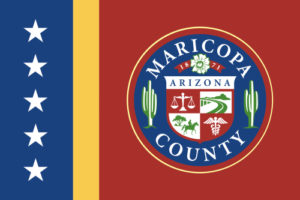 Maricopa County, Arizona, is a prime example of how connectivity can improve election administration and increase access. The county used broadband technology to adopt a vote center model, effectively eliminating out-of-precinct provisional voters. As a result, provisional ballots dropped from 52,173 in 2016 to 18,310 in 2020, reducing ballots rejected due to wrong-precinct voting and the amount of postelection processing. With e-pollbooks at these vote centers, administrators can rapidly update voter registration addresses, leading to more accurate and up-to-date voter lists. This kind of shift toward a more modern and accessible voting system exemplifies one of the many ways that connectivity can benefit election security and foster civic engagement.
Maricopa County, Arizona, is a prime example of how connectivity can improve election administration and increase access. The county used broadband technology to adopt a vote center model, effectively eliminating out-of-precinct provisional voters. As a result, provisional ballots dropped from 52,173 in 2016 to 18,310 in 2020, reducing ballots rejected due to wrong-precinct voting and the amount of postelection processing. With e-pollbooks at these vote centers, administrators can rapidly update voter registration addresses, leading to more accurate and up-to-date voter lists. This kind of shift toward a more modern and accessible voting system exemplifies one of the many ways that connectivity can benefit election security and foster civic engagement.
Connectivity also promotes voting access by enabling voters to readily find detailed and accurate information about candidates, policies, and voting procedures, including how to register or update registration records. It also allows voters to contact their local election departments more easily if they have questions or concerns about the process. Furthermore, connectivity can improve election  administration by enabling poll workers and local election officials to rapidly communicate about any urgent problems, from security threats to logistical snags. This kind of seamless coordination through an open communication channel, made possible by robust broadband connectivity, has the potential to markedly improve the voting experience for voters and election workers alike.
administration by enabling poll workers and local election officials to rapidly communicate about any urgent problems, from security threats to logistical snags. This kind of seamless coordination through an open communication channel, made possible by robust broadband connectivity, has the potential to markedly improve the voting experience for voters and election workers alike.
Conversely, disparate internet access can exacerbate existing barriers to voting, particularly in rural and historically underserved communities. The lack of internet access in Arizona’s tribal lands, for instance, hinders the use of e-pollbooks and reduces the options available to communicate important information with voters. Without sufficient broadband infrastructure, e-pollbooks may be unable to instantly access and verify the most current voter records, which could result in some voters having to cast provisional ballots.
Additionally, because addresses on tribal lands are often not standardized,(2) some voters are assigned to polling locations that are far away from their homes. A number of those voters have tried to vote at their closest polling place, only to find that they can’t vote a regular ballot at that location. In 2020, Arizona’s Apache County, most of which is made up of tribal lands, experienced the state’s highest rate of provisional ballot rejections, primarily due to voting in incorrect precincts. Moreover, inadequate internet connectivity impedes access to vital voting information, including registration details, polling locations, and ballot drop-off points. And it limits the ability to get in touch with election offices, deepening the challenges faced by voters on reservations.
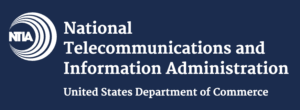 Poorer and rural areas often lack the broadband infrastructure necessary to offer more technologically advanced options. To remedy this, the federal government recently allocated billions of dollars in grant funds to close the digital divide through initiatives administered by the National Telecommunications and Information Administration (NTIA). This sweeping development presents important opportunities for productive partnerships between NTIA officials, state broadband agencies, and election administrators. Many states, under the leadership of their designated state broadband agency, are obtaining feedback from state and local stakeholders as they draft plans for how to invest these funds.
Poorer and rural areas often lack the broadband infrastructure necessary to offer more technologically advanced options. To remedy this, the federal government recently allocated billions of dollars in grant funds to close the digital divide through initiatives administered by the National Telecommunications and Information Administration (NTIA). This sweeping development presents important opportunities for productive partnerships between NTIA officials, state broadband agencies, and election administrators. Many states, under the leadership of their designated state broadband agency, are obtaining feedback from state and local stakeholders as they draft plans for how to invest these funds.
Regrettably, election officials have largely been absent from these important discussions. (3) It’s critical for the long-term health of our democracy that they be brought in so that these federal resources can be invested in our election infrastructure.
Understanding the NTIA and BEAD Program
 The National Telecommunications and Information Administration, part of the Department of Commerce, supports state, local, and tribal governments working to expand broadband connectivity and foster digital inclusion. Recognizing connectivity’s crucial impact on the vitality and accessibility of key societal sectors, including commerce, education, and civic participation, the NTIA supports initiatives such as the Broadband Equity, Access, and Deployment (BEAD) Program. This program funds collaborative projects among states, territories, communities, and key stakeholders to build necessary infrastructure and broaden high-speed internet access nationwide. With a focus on reaching unserved and historically underserved regions, these efforts seek to bridge the digital divide, with all 50 states and U.S. territories eligible for this funding.
The National Telecommunications and Information Administration, part of the Department of Commerce, supports state, local, and tribal governments working to expand broadband connectivity and foster digital inclusion. Recognizing connectivity’s crucial impact on the vitality and accessibility of key societal sectors, including commerce, education, and civic participation, the NTIA supports initiatives such as the Broadband Equity, Access, and Deployment (BEAD) Program. This program funds collaborative projects among states, territories, communities, and key stakeholders to build necessary infrastructure and broaden high-speed internet access nationwide. With a focus on reaching unserved and historically underserved regions, these efforts seek to bridge the digital divide, with all 50 states and U.S. territories eligible for this funding.
Although many states and territories have already submitted their BEAD proposals to the NTIA for review, including election administrators in ongoing consultative discussions presents an opportunity to explore the benefits of expanded broadband connectivity for voters and the voting process.
Integrating Elections into the Conversation
The NTIA can support election infrastructure through various means. Among its top priorities, the BEAD Program emphasizes its objective of “deploying and/or upgrading broadband network facilities to provide or improve service to an eligible community anchor institution.”
Upon addressing broadband needs in unserved and underserved regions, states and territories with BEAD funding could strategically prioritize the allocation of resources to multifunctional community institutions — places such as schools and libraries, already deemed by the NTIA as community anchor institutions, that are also common voting centers — to maximize the impact of these investments. Alternatively, in their state plans, state broadband agencies could categorically classify all voting locations as community anchor institutions, recognizing their role in providing essential community services to local voters. This classification would ensure dedicated support for election infrastructure and could enhance the voting experience, particularly in underserved communities. It would also support the diligent efforts of county governments, which typically fund the resources essential for administering safe and secure elections.
Bolstering election infrastructure with these funds closely aligns with the directive stated in the White House Executive Order on Promoting Access to Voting issued on March 7, 2021. This order emphasizes the importance for agencies to “consider ways to expand citizens’ opportunities to register to vote and to obtain information about, and participate in, the electoral process.”
Election Official Engagement in Broadband Expansion
On December 6, 2023, the Brennan Center for Justice submitted a public comment to the Arizona Commerce Authority (ACA) regarding Volume II of Arizona’s initial BEAD Program proposal. We urged the ACA to involve election officials in these discussions to guarantee that  Arizona’s BEAD funding implementation strategy adequately incorporates considerations for election infrastructure and recommended that state officials recognize designated polling locations as key community anchor institutions.
Arizona’s BEAD funding implementation strategy adequately incorporates considerations for election infrastructure and recommended that state officials recognize designated polling locations as key community anchor institutions.
In addition, earlier this year, Arizona Secretary of State Adrian Fontes and the Brennan Center met with NTIA representatives to discuss the essential contributions of secretaries of state and election administrators across the nation in delivering safe, secure, and accurate elections, and the significant role that broadband connectivity could have in bolstering these efforts.
Election officials, deeply familiar with and dedicated to their communities, stand as invaluable advisors, and they should be included in the discussions about the investment priorities for this funding that are currently underway. The NTIA should encourage state and territorial governments receiving BEAD funds to proactively engage and collaborate with state and local election officials during the review of implementation proposals. It could direct its representatives in each state or territory to incorporate election infrastructure into their discussions about community anchor institutions and to involve state and local election authorities as key community stakeholders in these deliberations. Election officials can also leverage this opportunity to identify and get in touch with relevant points of contact for their state or territory to begin engaging in these conversations.
Furthermore, election officials can collaborate with state broadband offices to utilize connectivity maps from the National Broadband Availability Map or the Federal Communications Commission to guide the strategic placement of polling locations for optimal access. In areas with tribal communities, officials should partner with liaisons from the Tribal Broadband Connectivity Program to understand connectivity on tribal lands.
Broadband expansion has untapped potential for election administration. The BEAD Program, with its historic investment in high-speed internet access, provides a framework through which existing and potential voting locations can be supported as vital hubs of community and civic engagement. This consideration would not merely be administrative — it would be a strategic move to equip these critical nodes in our democracy with the technological infrastructure necessary to safeguard and secure every vote.
Keely Varvel is the assistant secretary of state of Arizona.
Footnotes
1) National Association of Counties, “NACo, Rural LISC and RCAP Launch Mobile App and Announce the Bridging the Economic Divide Partnership to Address Rural Broadband Access,” March 5, 2019, link.
2) For example, the Navajo Nation, one of the largest tribal nations in the country, spanning over 27,000 square miles across Arizona, New Mexico, and Utah, faces unique voting challenges. Navajo communities often span across county boundaries, making it harder for voters to determine the correct location to cast their ballots due to overlapping borders and the absence of street addresses on reservation territories. The reliance on P.O. boxes, often located in different states or counties, further complicates the voting process, making registration and ballot access difficult for many residents. Voting Rights and Elections Administration in Arizona, Hearing Before the Subcomm. on Elections, H. Comm. on Administration, 116th Cong. (2019) (written testimony of the Honorable Jonathan Nez, President, The Navajo Nation), link.
3) Although many election officials have not been actively involved in these critical discussions, we can draw insights from states like Louisiana, where the planning processes included active participation and input from the secretary of state’s office, engaging them as essential stakeholders. Louisiana Office of Broadband Development & Connectivity, BEAD Initial Proposal Volume 2, December 7, 2023, 134, link.
electionline Daily News Email
 What’s the best part of waking up? electionline Daily News in your inbox of course so be sure to sign up for your daily dose.
What’s the best part of waking up? electionline Daily News in your inbox of course so be sure to sign up for your daily dose.
Each morning you’ll receive the top headlines of the day, plus a listing of states featured in that day’s news round up.
To sign up, simply visit our site and provide us with your email and you’ll begin receiving the news in your inbox each morning.
We Google so you don’t have to!
Election News This Week
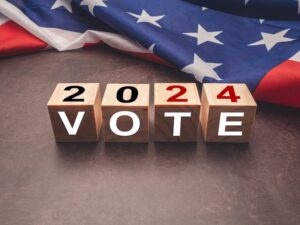 2024 Primaries: The 2024 primary season continued this week with several states – Maine, Nevada, North Dakota and South Carolina – holding primaries. Overall things went well this week with the biggest story from most primary states being turnout–or lack thereof. In Maine, Secretary of State Shenna Bellows said turnout was “extraordinarily low”. A spokesperson for the secretary of state’s office said Tuesday evening that turnout appeared to remain light at polling places throughout the state. This week’s election was the first semi-open primary for state races under a new law that allows unenrolled voters to cast ballots in party primaries that were once open only to each party’s membership. “We’re continuing to educate the unenrolled voters that they can participate,” Bellows said. “We’re still trying to get the word out because a lot of unenrolled voters who call themselves independents have been trained to think that they can’t participate on primary day. That’s changed.” Bellows said she had not heard of any polling problems Tuesday but said it’s not uncommon for there to be some small technical issues that election officials at local precincts are equipped to work through. Nevada’s primary election day was marked by low turnout, excessive heat in the state’s most populous county, and a smooth execution of universal mail-in voting across the state. “Early voting ran smoothly, and Election Day went well,” said Nevada Secretary of State Cisco Aguilar. Aguliar attributed the smooth election process to his office’s Voter Registration and Election Management Solution (VREMS) project, which streamlined vote tabulation through a centralized statewide voter registration database and election management system.. On her primary day experience, Henderson City council candidate Monica Larson said the experience was “very efficient, surprisingly efficient, so I really enjoyed it.” “Painless,” she added. The story was the same in North Dakota. Cass County Election Administrator Craig Steingaard said there have been no reported issues at the sites. “All of our sites were running very efficiently,” Steingaard said. “Voters seem to be happy.” There were some minor issues but no major problems in South Carolina. One polling place in Greenville County opened about 30 minutes late due to confusion amongst poll workers. Spartanburg County leaders urged voters to be on high-alert t after a report of a fake text message. They said someone posed as Spartanburg County election officials and sent a text to voters relating to voter intimidation. Spartanburg County leaders said they received a complaint after 8 a.m. from a voter who said he received the text message. A polling place in Horry County was temporarily put on lockdown after a man fired a gun near the polling place, but the polling place was not the intended target.
2024 Primaries: The 2024 primary season continued this week with several states – Maine, Nevada, North Dakota and South Carolina – holding primaries. Overall things went well this week with the biggest story from most primary states being turnout–or lack thereof. In Maine, Secretary of State Shenna Bellows said turnout was “extraordinarily low”. A spokesperson for the secretary of state’s office said Tuesday evening that turnout appeared to remain light at polling places throughout the state. This week’s election was the first semi-open primary for state races under a new law that allows unenrolled voters to cast ballots in party primaries that were once open only to each party’s membership. “We’re continuing to educate the unenrolled voters that they can participate,” Bellows said. “We’re still trying to get the word out because a lot of unenrolled voters who call themselves independents have been trained to think that they can’t participate on primary day. That’s changed.” Bellows said she had not heard of any polling problems Tuesday but said it’s not uncommon for there to be some small technical issues that election officials at local precincts are equipped to work through. Nevada’s primary election day was marked by low turnout, excessive heat in the state’s most populous county, and a smooth execution of universal mail-in voting across the state. “Early voting ran smoothly, and Election Day went well,” said Nevada Secretary of State Cisco Aguilar. Aguliar attributed the smooth election process to his office’s Voter Registration and Election Management Solution (VREMS) project, which streamlined vote tabulation through a centralized statewide voter registration database and election management system.. On her primary day experience, Henderson City council candidate Monica Larson said the experience was “very efficient, surprisingly efficient, so I really enjoyed it.” “Painless,” she added. The story was the same in North Dakota. Cass County Election Administrator Craig Steingaard said there have been no reported issues at the sites. “All of our sites were running very efficiently,” Steingaard said. “Voters seem to be happy.” There were some minor issues but no major problems in South Carolina. One polling place in Greenville County opened about 30 minutes late due to confusion amongst poll workers. Spartanburg County leaders urged voters to be on high-alert t after a report of a fake text message. They said someone posed as Spartanburg County election officials and sent a text to voters relating to voter intimidation. Spartanburg County leaders said they received a complaint after 8 a.m. from a voter who said he received the text message. A polling place in Horry County was temporarily put on lockdown after a man fired a gun near the polling place, but the polling place was not the intended target.
 Citizenship: According to new findings about 1 in 10 adult citizens, or 21.3 million eligible voters, say they either do not have or could not quickly find in order to show the next day their U.S. birth certificate, passport, naturalization certificate or certificate of citizenship. The new findings, shared first with NPR, also show disparities by race, ethnicity and political affiliation. U.S. citizens of color are more likely than white citizens, who do not identify as Latino, to say they lack citizenship documents (3% of people of color compared to 1% of white people) or can’t readily access them (11% of people of color vs. 8% of white people). Independents are more likely to report that they don’t have documents (4%) compared to Democrats (2%) and Republicans (1%). They are also more likely to report not having ready document access (13%) than Democrats (10%) and Republicans (7%). “We’ve got a huge crisis on our hands when we think about the people who lack the documents required to prove their citizenship and identity. And we really need to think about the far-reaching implications for that when it comes to economic and social and voting access,” says Lauren Kunis, executive director of VoteRiders, a voting rights organization focused on voter ID issues that sponsored the survey alongside groups including the Brennan Center for Justice at New York University’s law school and the University of Maryland’s Center for Democracy and Civic Engagement. The findings come as top Republicans are lining up behind a proposal to require proof of U.S. citizenship for voter registration in federal elections.
Citizenship: According to new findings about 1 in 10 adult citizens, or 21.3 million eligible voters, say they either do not have or could not quickly find in order to show the next day their U.S. birth certificate, passport, naturalization certificate or certificate of citizenship. The new findings, shared first with NPR, also show disparities by race, ethnicity and political affiliation. U.S. citizens of color are more likely than white citizens, who do not identify as Latino, to say they lack citizenship documents (3% of people of color compared to 1% of white people) or can’t readily access them (11% of people of color vs. 8% of white people). Independents are more likely to report that they don’t have documents (4%) compared to Democrats (2%) and Republicans (1%). They are also more likely to report not having ready document access (13%) than Democrats (10%) and Republicans (7%). “We’ve got a huge crisis on our hands when we think about the people who lack the documents required to prove their citizenship and identity. And we really need to think about the far-reaching implications for that when it comes to economic and social and voting access,” says Lauren Kunis, executive director of VoteRiders, a voting rights organization focused on voter ID issues that sponsored the survey alongside groups including the Brennan Center for Justice at New York University’s law school and the University of Maryland’s Center for Democracy and Civic Engagement. The findings come as top Republicans are lining up behind a proposal to require proof of U.S. citizenship for voter registration in federal elections.
 Artificial Intelligence: This week, Aspen Institute’s Aspen Digital program identified three specific AI-powered threats that it said bad actors are likely to use this election season: hyperlocal voter suppression, language-based influence operations and deepfakes. To combat this possibility, Aspen Digital released three checklists that public and private groups can use to help voters better understand these threats and turn to trusted sources of information. To respond to this threat, Aspen Digital said, in part, that social media platforms could employ emerging technologies to identify false election information, including through the use of “AI tools to monitor content-level narratives to identify trends and detect malign influence actors that may vary language to avoid detection.” To combat language-based influence operations powered by AI — which the document said “reduces the effort needed for bad actors to create malicious content in any language by automating translation” — Aspen Digital also said that election officials could utilize similar capabilities of their own. “Translate first-party resources and consider responsible ways to use AI tools to translate social media and other official communications,” the report suggested for election administrators. “If using AI translation tools, perform quality checks, notify readers when automated translation has been used and link to an authoritative resource, where applicable.” Aspen Digital said election officials and other organizations should develop verification and mitigation protocols now to identify this type of generated content and work to inform communities about the likelihood of this threat. In addition, the report said social media platforms should monitor content on “niche forums” to identify deepfakes that might spread to their sites and “consider using AI-enabled, narrative-level summation tools to monitor real time narrative trends.”
Artificial Intelligence: This week, Aspen Institute’s Aspen Digital program identified three specific AI-powered threats that it said bad actors are likely to use this election season: hyperlocal voter suppression, language-based influence operations and deepfakes. To combat this possibility, Aspen Digital released three checklists that public and private groups can use to help voters better understand these threats and turn to trusted sources of information. To respond to this threat, Aspen Digital said, in part, that social media platforms could employ emerging technologies to identify false election information, including through the use of “AI tools to monitor content-level narratives to identify trends and detect malign influence actors that may vary language to avoid detection.” To combat language-based influence operations powered by AI — which the document said “reduces the effort needed for bad actors to create malicious content in any language by automating translation” — Aspen Digital also said that election officials could utilize similar capabilities of their own. “Translate first-party resources and consider responsible ways to use AI tools to translate social media and other official communications,” the report suggested for election administrators. “If using AI translation tools, perform quality checks, notify readers when automated translation has been used and link to an authoritative resource, where applicable.” Aspen Digital said election officials and other organizations should develop verification and mitigation protocols now to identify this type of generated content and work to inform communities about the likelihood of this threat. In addition, the report said social media platforms should monitor content on “niche forums” to identify deepfakes that might spread to their sites and “consider using AI-enabled, narrative-level summation tools to monitor real time narrative trends.”
 Mascot News: We don’t have any sticker news this week (gasp!) but we may have something just as fun. We learned this week that the New York State Board of Elections has a mascot! A mascot! Ballot the Beaver made their debut this week to coincide with the board’s 50th anniversary. The beaver was also named the state’s official animal 49 years ago. “As two children of the ‘70s, they seemed like a natural pair,” NYSBOE spokesperson Kathleen McGrath told the Daily Gazette in an email. Ballot serves in an educational and promotional role. The male cartoon beaver has already appeared in a social media post, explaining that 16- and 17-year-olds can pre-register to vote. Ballot will be used in agency materials to provide facts about elections and combat false information. “With Ballot’s help, New Yorkers can become more informed and vigilant voters,” McGrath said. “They can learn to question dubious information, verify facts, and report false claims.” “While I cannot speak to other state agencies and their potential mascots, Ballot the Beaver is definitely here to stay,” McGrath said. “Look for him all year long!” The mascot already has made a fan out of Schenectady Republican Committee Chairman Thomas Kennedy. He saw the character after it first debuted on Facebook. “I absolutely love it,” Kennedy told the Daily Gazette. While electionline doesn’t do any sort of endorsements, we endorse this idea and look forward to seeing what other elections offices come up with.
Mascot News: We don’t have any sticker news this week (gasp!) but we may have something just as fun. We learned this week that the New York State Board of Elections has a mascot! A mascot! Ballot the Beaver made their debut this week to coincide with the board’s 50th anniversary. The beaver was also named the state’s official animal 49 years ago. “As two children of the ‘70s, they seemed like a natural pair,” NYSBOE spokesperson Kathleen McGrath told the Daily Gazette in an email. Ballot serves in an educational and promotional role. The male cartoon beaver has already appeared in a social media post, explaining that 16- and 17-year-olds can pre-register to vote. Ballot will be used in agency materials to provide facts about elections and combat false information. “With Ballot’s help, New Yorkers can become more informed and vigilant voters,” McGrath said. “They can learn to question dubious information, verify facts, and report false claims.” “While I cannot speak to other state agencies and their potential mascots, Ballot the Beaver is definitely here to stay,” McGrath said. “Look for him all year long!” The mascot already has made a fan out of Schenectady Republican Committee Chairman Thomas Kennedy. He saw the character after it first debuted on Facebook. “I absolutely love it,” Kennedy told the Daily Gazette. While electionline doesn’t do any sort of endorsements, we endorse this idea and look forward to seeing what other elections offices come up with.
Personnel News: Paulina Gutiérrez has officially been confirmed as Milwaukee, Wisconsin’s new elections chief. Ann Jacobs has been elected chair of the Wisconsin Elections Commission. Jared McLean is the new Stephens County, Texas elections administrator.
Legislative Updates
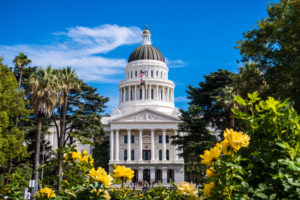 California: After a congressional recount, one lawmaker is introducing a bill to mandate automatic recounts for statewide elections with tight margins. Assembly Bill 996, authored by Assemblymember Evan Low, calls for any statewide election with a margin of less than 25 votes or 0.25% of the cast ballots to be subjected to an automatic recount, which mirrors Santa Clara County’s automatic recount policy for county elections. The bill would also require contributors who spend $10,000 or more on voter-requested recounts to be reported to county election officials and publicized within 24 hours. Low was subject to a voter-requested recount with unknown funders in the Congressional District 16 contest, during which he tied with Supervisor Joe Simitian for second place in the March primary election. He said automatic recounts on tight races will protect election integrity and ensure recounts are impartial. “Locally in Santa Clara County, very close races are already recounted automatically and that should be the case for any state race that is extremely close,” Low told San José Spotlight. “AB 996 will ensure California election integrity and transparency by requiring recounts in close races and disclosure of large donors in voter-requested recounts, helping boost voter confidence in California’s elections.” AB 996 is awaiting referral to a state Senate committee.
California: After a congressional recount, one lawmaker is introducing a bill to mandate automatic recounts for statewide elections with tight margins. Assembly Bill 996, authored by Assemblymember Evan Low, calls for any statewide election with a margin of less than 25 votes or 0.25% of the cast ballots to be subjected to an automatic recount, which mirrors Santa Clara County’s automatic recount policy for county elections. The bill would also require contributors who spend $10,000 or more on voter-requested recounts to be reported to county election officials and publicized within 24 hours. Low was subject to a voter-requested recount with unknown funders in the Congressional District 16 contest, during which he tied with Supervisor Joe Simitian for second place in the March primary election. He said automatic recounts on tight races will protect election integrity and ensure recounts are impartial. “Locally in Santa Clara County, very close races are already recounted automatically and that should be the case for any state race that is extremely close,” Low told San José Spotlight. “AB 996 will ensure California election integrity and transparency by requiring recounts in close races and disclosure of large donors in voter-requested recounts, helping boost voter confidence in California’s elections.” AB 996 is awaiting referral to a state Senate committee.
 Colorado: Gov. Jared Polis signed into law a bill that would delay the implementation of a sweeping election overhaul poised to make the 2024 ballot. But the governor and top lawmakers on both sides of the aisle pledged to promptly take up legislation fulfilling the intent of the measure, which proposes to abolish the party primary and assembly system and implement ranked choice voting for state and federal offices, if the initiative wins approval from Colorado voters. Senate Bill 24-210, passed by large bipartisan majorities in the General Assembly last month, included a variety of reforms to election security and administration broadly supported by voting rights groups and local elections officials. But it also contained a last-minute amendment introduced on the House floor by Democratic state Rep. Emily Sirota of Denver, enacting a series of hurdles that must be cleared before the new election system could go into effect. Under SB-210, the proposed system could not take effect until a number of Colorado local governments meeting various population and demographic criteria have implemented ranked choice voting, and the Colorado secretary of state has completed an analysis of its implementation and impacts on “historically under-represented communities.” The Colorado County Clerks Association, which represents local elections officials from across the state and supported “guardrails” on a ranked choice voting rollout like those added to SB-210, had urged Polis to sign the bill. A coalition of left-leaning interest groups also lobbied against a veto, writing in a letter that Unite America’s proposal would enact “expensive, untested, and inaccessible processes that hurt voters and disproportionately benefit money-backed candidates.”
Colorado: Gov. Jared Polis signed into law a bill that would delay the implementation of a sweeping election overhaul poised to make the 2024 ballot. But the governor and top lawmakers on both sides of the aisle pledged to promptly take up legislation fulfilling the intent of the measure, which proposes to abolish the party primary and assembly system and implement ranked choice voting for state and federal offices, if the initiative wins approval from Colorado voters. Senate Bill 24-210, passed by large bipartisan majorities in the General Assembly last month, included a variety of reforms to election security and administration broadly supported by voting rights groups and local elections officials. But it also contained a last-minute amendment introduced on the House floor by Democratic state Rep. Emily Sirota of Denver, enacting a series of hurdles that must be cleared before the new election system could go into effect. Under SB-210, the proposed system could not take effect until a number of Colorado local governments meeting various population and demographic criteria have implemented ranked choice voting, and the Colorado secretary of state has completed an analysis of its implementation and impacts on “historically under-represented communities.” The Colorado County Clerks Association, which represents local elections officials from across the state and supported “guardrails” on a ranked choice voting rollout like those added to SB-210, had urged Polis to sign the bill. A coalition of left-leaning interest groups also lobbied against a veto, writing in a letter that Unite America’s proposal would enact “expensive, untested, and inaccessible processes that hurt voters and disproportionately benefit money-backed candidates.”
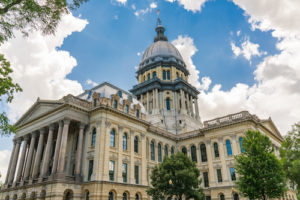 Illinois: House Bill 4488, which is awaiting Gov. J.B. Pritzker’s signature, seeks to codify emergency rules put into place during the pandemic to assist nursing home voters with casting a ballot. Along with codifying vote-by-mail procedures in Illinois nursing homes, the proposed law would remove all caps on transfers from political party committees to candidates during primary elections. Previously, caps were only absent in general elections. Opponents are concerned poll watchers won’t be able to verify vote-by-mail procedures conducted in nursing homes where voters may be physically and mentally incapacitated. “They’re already able to vote-by-mail in nursing homes, we are just clarifying a rule that was put in place during the pandemic and putting it in statute,” said Rep. Maurice West, D-Rockford. In Illinois, opponents fear the proposed law will allow incapacitated voters to be coerced into turning in incomplete ballots by nefarious ballot harvesters. State Rep. Patrick Windhorst, R-Metropolis, raised concerns that nursing home voters could cast a vote through vote-by-mail procedures. Previously, those voters only casted ballots on the premises. Proponents argue the change will expand voter rights and provide convenience to older voters. The proposed law applies to federally operated nursing homes, veterans’ homes, hospitals or facilities.
Illinois: House Bill 4488, which is awaiting Gov. J.B. Pritzker’s signature, seeks to codify emergency rules put into place during the pandemic to assist nursing home voters with casting a ballot. Along with codifying vote-by-mail procedures in Illinois nursing homes, the proposed law would remove all caps on transfers from political party committees to candidates during primary elections. Previously, caps were only absent in general elections. Opponents are concerned poll watchers won’t be able to verify vote-by-mail procedures conducted in nursing homes where voters may be physically and mentally incapacitated. “They’re already able to vote-by-mail in nursing homes, we are just clarifying a rule that was put in place during the pandemic and putting it in statute,” said Rep. Maurice West, D-Rockford. In Illinois, opponents fear the proposed law will allow incapacitated voters to be coerced into turning in incomplete ballots by nefarious ballot harvesters. State Rep. Patrick Windhorst, R-Metropolis, raised concerns that nursing home voters could cast a vote through vote-by-mail procedures. Previously, those voters only casted ballots on the premises. Proponents argue the change will expand voter rights and provide convenience to older voters. The proposed law applies to federally operated nursing homes, veterans’ homes, hospitals or facilities.
 Evanston, Illinois: City Council voted to introduce an ordinance for the implementation of ranked-choice voting and discussed an amendment to Evanston’s Residential Landlord Tenant Ordinance Monday night. On November 8, 2022, Evanston voters passed a referendum that established ranked-choice voting for elected city officials. The City of Evanston authorized this through its Home Rule powers, however, the Cook County Clerk has not taken any action to implement these changes, according to the ordinance. Because of this, Evanston Mayor Daniel Biss recommended the approval of this ordinance in order to “eliminate all barriers to implementation.” “This is an action in support of any effort to make sure that the will of the voters of Evanston — as overwhelmingly expressed in November 2022 — is reflected in the way elections are implemented in April of 2025,” Biss said. The ordinance was passed by a 7-1 vote, with Ald. Juan Geracaris (9th) absent and Ald. Devon Reid (8th) dissenting, voting “hell no.” The ordinance will be voted on again at Council’s next meeting, June 24, for action.
Evanston, Illinois: City Council voted to introduce an ordinance for the implementation of ranked-choice voting and discussed an amendment to Evanston’s Residential Landlord Tenant Ordinance Monday night. On November 8, 2022, Evanston voters passed a referendum that established ranked-choice voting for elected city officials. The City of Evanston authorized this through its Home Rule powers, however, the Cook County Clerk has not taken any action to implement these changes, according to the ordinance. Because of this, Evanston Mayor Daniel Biss recommended the approval of this ordinance in order to “eliminate all barriers to implementation.” “This is an action in support of any effort to make sure that the will of the voters of Evanston — as overwhelmingly expressed in November 2022 — is reflected in the way elections are implemented in April of 2025,” Biss said. The ordinance was passed by a 7-1 vote, with Ald. Juan Geracaris (9th) absent and Ald. Devon Reid (8th) dissenting, voting “hell no.” The ordinance will be voted on again at Council’s next meeting, June 24, for action.
 Louisiana: Secretary of State Nancy Landry is announcing a successful passage of bills from the legislature aimed at protecting election integrity in the state. HB 114 by Representative Les Farnum enacts an expanded voter canvass to further ensure that Louisiana’s voter rolls are accurate. HB 285 (Now Act 264) by Representative Mark Wright creates the Division of Election Integrity within the Department of State. HB 449 (Now Act 25) by Representative Michael Melerine requires court judgments of interdiction to be delivered to the Registrar of Voters in the parish in which the interdicted individual is registered. HB 476 by Representative Josh Carlson further cracks down on absentee ballot harvesting. HB 506 by Representative Polly Thomas requires that those conducting voter registration drives register with the Secretary of State’s office, ensuring that voter registrations are timely submitted and that voters’ personal information is further protected. HB 581 by Representative Polly Thomas provides for more specific penalties for those witnessing more than one absentee ballot of a non-family member; requires that those signing as a witness on an absentee ballot be at least 18 years of age; and requires the witness to provide their address. SB 101 (Now Act 291) by Senator Blake Miguez bans ranked-choice voting in Louisiana elections. SB 155 (Now Act 302) by Senator Caleb Kleinpeter prohibits individuals from assisting with more than one absentee ballot except for immediate family members. SB 218 (Now Act 317) by Senator Caleb Kleinpeter restricts the unsolicited distribution of absentee ballot applications. SB 226 (Now Act 321) by Senator Heather Cloud creates uniform standards for tabulating absentee ballots. SB 436 by Senator Mike Fesi allows the Secretary of State to require proof of United States citizenship when registering to vote.
Louisiana: Secretary of State Nancy Landry is announcing a successful passage of bills from the legislature aimed at protecting election integrity in the state. HB 114 by Representative Les Farnum enacts an expanded voter canvass to further ensure that Louisiana’s voter rolls are accurate. HB 285 (Now Act 264) by Representative Mark Wright creates the Division of Election Integrity within the Department of State. HB 449 (Now Act 25) by Representative Michael Melerine requires court judgments of interdiction to be delivered to the Registrar of Voters in the parish in which the interdicted individual is registered. HB 476 by Representative Josh Carlson further cracks down on absentee ballot harvesting. HB 506 by Representative Polly Thomas requires that those conducting voter registration drives register with the Secretary of State’s office, ensuring that voter registrations are timely submitted and that voters’ personal information is further protected. HB 581 by Representative Polly Thomas provides for more specific penalties for those witnessing more than one absentee ballot of a non-family member; requires that those signing as a witness on an absentee ballot be at least 18 years of age; and requires the witness to provide their address. SB 101 (Now Act 291) by Senator Blake Miguez bans ranked-choice voting in Louisiana elections. SB 155 (Now Act 302) by Senator Caleb Kleinpeter prohibits individuals from assisting with more than one absentee ballot except for immediate family members. SB 218 (Now Act 317) by Senator Caleb Kleinpeter restricts the unsolicited distribution of absentee ballot applications. SB 226 (Now Act 321) by Senator Heather Cloud creates uniform standards for tabulating absentee ballots. SB 436 by Senator Mike Fesi allows the Secretary of State to require proof of United States citizenship when registering to vote.
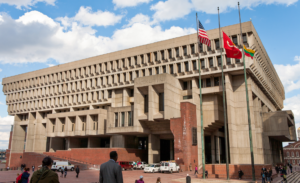 Boston, Massachusetts: Boston City Council President Ruthzee Louijeune is leading a new push to implement a ranked-choice voting system for municipal elections, four years after Massachusetts voters rejected a similar statewide ballot initiative. In a home rule petition introduced this week, Louijeune argued that while 55% of Massachusetts voters in 2020 spurned a system where voters would rank a series of candidates by preference rather than simply select their top choice, there was actually “broad” support for the change in Boston, where 62% were in favor. Such a change, she said, would “modernize how we vote and how every voice is heard in our elections.” It would also foster greater civic engagement and reduce political polarization, she added. The change would promote the top four district council and mayoral candidates from the preliminary election, rather than the top-two-vote-getting candidates that currently advance. Voters would then rank up to four candidates in the order of their preference for each race in the final municipal election. If no candidate wins more than 50%, the bottom vote-getter is eliminated, and all of the ballots that went to them are allocated to voters’ second-place choices. If no one is above 50%, the process repeats, eliminating one candidate per round until there are only two candidates left, at which point the one with the most votes wins.
Boston, Massachusetts: Boston City Council President Ruthzee Louijeune is leading a new push to implement a ranked-choice voting system for municipal elections, four years after Massachusetts voters rejected a similar statewide ballot initiative. In a home rule petition introduced this week, Louijeune argued that while 55% of Massachusetts voters in 2020 spurned a system where voters would rank a series of candidates by preference rather than simply select their top choice, there was actually “broad” support for the change in Boston, where 62% were in favor. Such a change, she said, would “modernize how we vote and how every voice is heard in our elections.” It would also foster greater civic engagement and reduce political polarization, she added. The change would promote the top four district council and mayoral candidates from the preliminary election, rather than the top-two-vote-getting candidates that currently advance. Voters would then rank up to four candidates in the order of their preference for each race in the final municipal election. If no candidate wins more than 50%, the bottom vote-getter is eliminated, and all of the ballots that went to them are allocated to voters’ second-place choices. If no one is above 50%, the process repeats, eliminating one candidate per round until there are only two candidates left, at which point the one with the most votes wins.
 Ohio: Lawmakers are considering a sweeping overhaul of Ohio’s voting system that is pitting the state’s bipartisan elections officials against a right-wing citizen’s group that echoes arguments made by advocates of the widely rejected theory that the 2020 presidential election was marred by widespread fraud. House Bill 472 would require the state to replace all its voting machines while allowing citizens to propose requiring hand-counting of election ballots on a county-by-county basis, something elections officials say would result in delayed and less accurate election results. It also would require Ohioans to show a photo ID to register to vote – not just to cast a ballot like under current law – and expand a recently passed voter ID requirement to also apply to mail-in voting – a carve out that was retained in the last elections overhaul lawmakers passed in late 2022. The 258-page bill makes myriad changes to elections administration, many of which involve requiring elections officials to do more extensive and frequent checks of voting records to verify voting rolls only include eligible voters. Some proposed changes have no clear precedent – like requiring the state’s voter registration system to be converted to blockchain, the digital ledger software that powers Bitcoin and other cryptocurrencies, so that any changes can be publicly tracked and scrutinized. The bill’s opponents include elections officials, who view it as a costly and unnecessary update of an already secure system. The County Commissioners Association of Ohio, which represents county governments, voted Monday to oppose the bill for similar reasons. Democrats have described the proposal during committee hearings a voter suppression bill. “We see this bill as something that’s going to squeeze taxpayers across the board as well as burden voters,” said Paul Adams, director of the Lorain County Board of Elections and president of the Ohio Elections Officials Association. “It’s an unfunded mandate in search of a problem.”
Ohio: Lawmakers are considering a sweeping overhaul of Ohio’s voting system that is pitting the state’s bipartisan elections officials against a right-wing citizen’s group that echoes arguments made by advocates of the widely rejected theory that the 2020 presidential election was marred by widespread fraud. House Bill 472 would require the state to replace all its voting machines while allowing citizens to propose requiring hand-counting of election ballots on a county-by-county basis, something elections officials say would result in delayed and less accurate election results. It also would require Ohioans to show a photo ID to register to vote – not just to cast a ballot like under current law – and expand a recently passed voter ID requirement to also apply to mail-in voting – a carve out that was retained in the last elections overhaul lawmakers passed in late 2022. The 258-page bill makes myriad changes to elections administration, many of which involve requiring elections officials to do more extensive and frequent checks of voting records to verify voting rolls only include eligible voters. Some proposed changes have no clear precedent – like requiring the state’s voter registration system to be converted to blockchain, the digital ledger software that powers Bitcoin and other cryptocurrencies, so that any changes can be publicly tracked and scrutinized. The bill’s opponents include elections officials, who view it as a costly and unnecessary update of an already secure system. The County Commissioners Association of Ohio, which represents county governments, voted Monday to oppose the bill for similar reasons. Democrats have described the proposal during committee hearings a voter suppression bill. “We see this bill as something that’s going to squeeze taxpayers across the board as well as burden voters,” said Paul Adams, director of the Lorain County Board of Elections and president of the Ohio Elections Officials Association. “It’s an unfunded mandate in search of a problem.”
 Texas: A legislator who chairs the House elections committee is considering removing top election officials in counties across the state, expanding a controversial new law abolishing the Harris County elections office. Under SB1750, a law authored by state Sen. Paul Bettencourt, R-Houston, the Texas Legislature last year forced Harris County to return duties for overseeing elections back to the two elected positions that ran them until Commissioners Court voted in 2020 to create an appointed administrator. At a Texas House Elections Committee hearing on Wednesday, Committee Chair Reggie Smith, R-Sherman, raised the question of whether they should broaden the law moving forward to apply to more counties. The next legislative session won’t convene until January 2025, but lawmakers are holding interim committee hearings over the summer to monitor key issues and prepare for the year ahead. Committee members on Wednesday questioned Christina Adkins, director of the Texas Secretary of State’s elections division, and Harris County Clerk Teneshia Hudspeth about how the law has been implemented since going into effect last September. Hudspeth took over election duties, while Harris County Tax Assessor-Collector Ann Harris Bennett assumed responsibility for voter registration. More than half of Texas’ 254 counties have appointed elections administrators, but SB1750 applies only to counties with a population greater than 3.5 million. Harris County is the only county of that size.
Texas: A legislator who chairs the House elections committee is considering removing top election officials in counties across the state, expanding a controversial new law abolishing the Harris County elections office. Under SB1750, a law authored by state Sen. Paul Bettencourt, R-Houston, the Texas Legislature last year forced Harris County to return duties for overseeing elections back to the two elected positions that ran them until Commissioners Court voted in 2020 to create an appointed administrator. At a Texas House Elections Committee hearing on Wednesday, Committee Chair Reggie Smith, R-Sherman, raised the question of whether they should broaden the law moving forward to apply to more counties. The next legislative session won’t convene until January 2025, but lawmakers are holding interim committee hearings over the summer to monitor key issues and prepare for the year ahead. Committee members on Wednesday questioned Christina Adkins, director of the Texas Secretary of State’s elections division, and Harris County Clerk Teneshia Hudspeth about how the law has been implemented since going into effect last September. Hudspeth took over election duties, while Harris County Tax Assessor-Collector Ann Harris Bennett assumed responsibility for voter registration. More than half of Texas’ 254 counties have appointed elections administrators, but SB1750 applies only to counties with a population greater than 3.5 million. Harris County is the only county of that size.
Legal Updates
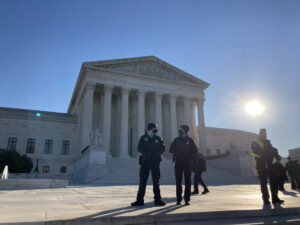 U.S. Supreme Court: West Virginia Secretary of State Mac Warner and chief election officers in eight other states have joined to bring legal action to try to stop an executive order issued by President Joe Biden they say would federalize state elections. Warner – along with the secretaries of state of Arkansas, Indiana, Louisiana, Mississippi, Montana, New Hampshire, Tennessee and Wyoming – filed an amicus brief May 28 asking the U.S. Supreme Court to rule Executive Order 14019 is unconstitutional and violates the authority granted to the states to regulate elections by the United States Constitution. Specifically, the secretaries of state seek to protect the voter registration process currently administered by the states. Biden issued the order March 7, 2021, directing federal agencies to develop ways and means to expand and promote voter registration and to increase participation in vote-by-mail ballot applications. The secretaries of states say the order inappropriately allows federal agencies to use non-appropriated federal funds to fulfill those directives. “The President’s use of executive action to convert federal agencies into get-out-the-vote operations is prohibited by the United States Constitution,” Warner said. “The Elections Clause of the Constitution specifically declares that the manner of running elections is left to the states, not the federal government. Registering eligible people to vote is an essential component and manner of running fair and secure elections.” The legal action says neither the National Voter Registration Act nor the Help America Vote Act allow a president to designate federal agencies as voter registration agencies. It says only Congress has the power to override state regulations by establishing uniform rules for federal elections.
U.S. Supreme Court: West Virginia Secretary of State Mac Warner and chief election officers in eight other states have joined to bring legal action to try to stop an executive order issued by President Joe Biden they say would federalize state elections. Warner – along with the secretaries of state of Arkansas, Indiana, Louisiana, Mississippi, Montana, New Hampshire, Tennessee and Wyoming – filed an amicus brief May 28 asking the U.S. Supreme Court to rule Executive Order 14019 is unconstitutional and violates the authority granted to the states to regulate elections by the United States Constitution. Specifically, the secretaries of state seek to protect the voter registration process currently administered by the states. Biden issued the order March 7, 2021, directing federal agencies to develop ways and means to expand and promote voter registration and to increase participation in vote-by-mail ballot applications. The secretaries of states say the order inappropriately allows federal agencies to use non-appropriated federal funds to fulfill those directives. “The President’s use of executive action to convert federal agencies into get-out-the-vote operations is prohibited by the United States Constitution,” Warner said. “The Elections Clause of the Constitution specifically declares that the manner of running elections is left to the states, not the federal government. Registering eligible people to vote is an essential component and manner of running fair and secure elections.” The legal action says neither the National Voter Registration Act nor the Help America Vote Act allow a president to designate federal agencies as voter registration agencies. It says only Congress has the power to override state regulations by establishing uniform rules for federal elections.
 Alabama: The Attorney General’s Office filed a request asking the court to reject a request for a preliminary injunction in the lawsuit over the state’s absentee voting law. Filed in the United States District Court of Alabama, the Attorney General argued in a 25-page filing that the plaintiffs have not shown they would likely succeed on the merits of the case and that the injunction would harm the state. “SB1 strikes a balance between security and accessibility, deterring fraudulent conduct while insulating vulnerable voters and the electoral system from manipulation,” the filing states. SB 1, sponsored by Sen. Garlan Gudger, R-Cullman, makes a person receiving a payment or gift for “distributing, ordering, requesting, collecting, completing, prefilling, obtaining or delivering” an application a Class C felony, punishable by up to 10 years in prison. If a person knowingly pays or provides a gift to a “third party to distribute, order, request, collect, prefill, complete, obtain or deliver,” then it would be a Class B felony, punishable by up to 20 years in prison. Civil Rights groups, including the ACLU of Alabama and the Alabama State Conference of the NAACP, filed a lawsuit to block the bill on April 4, which cited the state’s history of voter suppression and said that volunteers could be punished. The plaintiffs in a case against Alabama’s absentee ballot application law filed a response Monday to the defendants’ motion to have the case dismissed. In the 52-page filing in the Northern District of Alabama, the plaintiffs responded to claims by the Alabama Attorney General’s office’s motion to dismiss that alleged the law was not a burden on freedom of speech and that it was a “shotgun pleading.” “Defendants’ voluminous efforts to manufacture any cognizable deficiencies in Plaintiffs’ claims fall short,” attorneys for the plaintiffs wrote. The U.S. Department of Justice submitted a statement of interest to the case over the state’s absentee voting law expressing doubt of the legitimacy of the state’s arguments regarding absentee ballots. In the 12-page filing, attorneys for the Department of Justice wrote that the case presented “important” questions over Section 208 of the Voting Rights Act and that Congress gave the Attorney General authority to enforce the section. “Accordingly, the United States has a substantial interest in ensuring the proper interpretation of Section 208,” they wrote. “The United States takes no position on any factual disputes or any other legal questions in this case.”
Alabama: The Attorney General’s Office filed a request asking the court to reject a request for a preliminary injunction in the lawsuit over the state’s absentee voting law. Filed in the United States District Court of Alabama, the Attorney General argued in a 25-page filing that the plaintiffs have not shown they would likely succeed on the merits of the case and that the injunction would harm the state. “SB1 strikes a balance between security and accessibility, deterring fraudulent conduct while insulating vulnerable voters and the electoral system from manipulation,” the filing states. SB 1, sponsored by Sen. Garlan Gudger, R-Cullman, makes a person receiving a payment or gift for “distributing, ordering, requesting, collecting, completing, prefilling, obtaining or delivering” an application a Class C felony, punishable by up to 10 years in prison. If a person knowingly pays or provides a gift to a “third party to distribute, order, request, collect, prefill, complete, obtain or deliver,” then it would be a Class B felony, punishable by up to 20 years in prison. Civil Rights groups, including the ACLU of Alabama and the Alabama State Conference of the NAACP, filed a lawsuit to block the bill on April 4, which cited the state’s history of voter suppression and said that volunteers could be punished. The plaintiffs in a case against Alabama’s absentee ballot application law filed a response Monday to the defendants’ motion to have the case dismissed. In the 52-page filing in the Northern District of Alabama, the plaintiffs responded to claims by the Alabama Attorney General’s office’s motion to dismiss that alleged the law was not a burden on freedom of speech and that it was a “shotgun pleading.” “Defendants’ voluminous efforts to manufacture any cognizable deficiencies in Plaintiffs’ claims fall short,” attorneys for the plaintiffs wrote. The U.S. Department of Justice submitted a statement of interest to the case over the state’s absentee voting law expressing doubt of the legitimacy of the state’s arguments regarding absentee ballots. In the 12-page filing, attorneys for the Department of Justice wrote that the case presented “important” questions over Section 208 of the Voting Rights Act and that Congress gave the Attorney General authority to enforce the section. “Accordingly, the United States has a substantial interest in ensuring the proper interpretation of Section 208,” they wrote. “The United States takes no position on any factual disputes or any other legal questions in this case.”
 Alaska: Anchorage Superior Court Christina Rankin has ruled in favor of a proposed ballot measure that seeks to roll back the state’s elections system to what it was before 2020. Rankin sided generally with the state and rollback supporters, saying elections officials acted appropriately by allowing petitioners to fix problems with petition booklets needed to call a vote this November. A group of plaintiffs who support the current system had sued the Alaska Division of Elections in April, claiming the state improperly certified the rollback measure. Attorneys representing the plaintiffs had challenged state officials’ decision to allow petitioners to fix signature booklets that had not been properly notarized. If the booklets were disqualified, petitioners wouldn’t have had enough signatures to advance the rollback measure to a November vote. But Rankin, citing instructions given by the Division of Elections as far back as 2015, noted that the division has long allowed petitioners to make minor fixes to their booklets after the deadline to submit them for consideration. That practice is legal, she concluded, under a 2006 Alaska Supreme Court decision that said in part: “The right to initiative is a key feature of Alaska’s governance. Our Supreme Court has reiterated on several occasions that the right to initiative is not to be defeated by technical rule violations.” Rankin said the problem cited by plaintiffs is “precisely the type of technical rule violation that warrants application of the constitutional principle of interpreting legislative procedures in favor of placing initiatives on the ballot.”
Alaska: Anchorage Superior Court Christina Rankin has ruled in favor of a proposed ballot measure that seeks to roll back the state’s elections system to what it was before 2020. Rankin sided generally with the state and rollback supporters, saying elections officials acted appropriately by allowing petitioners to fix problems with petition booklets needed to call a vote this November. A group of plaintiffs who support the current system had sued the Alaska Division of Elections in April, claiming the state improperly certified the rollback measure. Attorneys representing the plaintiffs had challenged state officials’ decision to allow petitioners to fix signature booklets that had not been properly notarized. If the booklets were disqualified, petitioners wouldn’t have had enough signatures to advance the rollback measure to a November vote. But Rankin, citing instructions given by the Division of Elections as far back as 2015, noted that the division has long allowed petitioners to make minor fixes to their booklets after the deadline to submit them for consideration. That practice is legal, she concluded, under a 2006 Alaska Supreme Court decision that said in part: “The right to initiative is a key feature of Alaska’s governance. Our Supreme Court has reiterated on several occasions that the right to initiative is not to be defeated by technical rule violations.” Rankin said the problem cited by plaintiffs is “precisely the type of technical rule violation that warrants application of the constitutional principle of interpreting legislative procedures in favor of placing initiatives on the ballot.”
 Arizona: The leaders of the Arizona Republican Party and a conservative dark money group have filed a lawsuit alleging the state has not kept an accurate count of registered voters and asking a court to force elections officials to purge 500,000 Arizonans from the voter rolls. The lawsuit claims that the state’s list of registered voters contains up to 1.27 million voters who have either died or moved out of state, violating the National Voter Registration Act. Four counties in Arizona have more registered voters than total voting-age citizens, the group’s suit says — Apache, La Paz, Navajo and Santa Cruz. The suit uses 2022 voter registration figures and data from the U.S. Census Bureau. The suit was filed by Scot Mussi, president of the Arizona Free Enterprise Club; Arizona GOP chair Gina Swoboda; and Steve Gaynor, who unsuccessfully ran for the Republican nomination for Arizona secretary of state in 2018. “Election integrity is a serious issue in our nation,” said Mussi in a written statement announcing the lawsuit. “Ensuring that Arizonans can have faith in the integrity of our election system and representative government starts with clean voter rolls that leave no doubts about who is able to cast a ballot. In the suit, Mussi and the others claim that Secretary of State Adrian Fontes has failed to develop a maintenance program to remove ineligible voters, and that he has admitted to that failure, describing the program as “in development.” Arizona Secretary of State spokesperson JP Martin said that the state’s voter registration monitoring is “up to date and compliant with federal and state laws.” Martin said that Fontes’ office would not comment on an ongoing legal case, but voters have no reason for concern and that the lawsuit is based on speculation rather than evidence.
Arizona: The leaders of the Arizona Republican Party and a conservative dark money group have filed a lawsuit alleging the state has not kept an accurate count of registered voters and asking a court to force elections officials to purge 500,000 Arizonans from the voter rolls. The lawsuit claims that the state’s list of registered voters contains up to 1.27 million voters who have either died or moved out of state, violating the National Voter Registration Act. Four counties in Arizona have more registered voters than total voting-age citizens, the group’s suit says — Apache, La Paz, Navajo and Santa Cruz. The suit uses 2022 voter registration figures and data from the U.S. Census Bureau. The suit was filed by Scot Mussi, president of the Arizona Free Enterprise Club; Arizona GOP chair Gina Swoboda; and Steve Gaynor, who unsuccessfully ran for the Republican nomination for Arizona secretary of state in 2018. “Election integrity is a serious issue in our nation,” said Mussi in a written statement announcing the lawsuit. “Ensuring that Arizonans can have faith in the integrity of our election system and representative government starts with clean voter rolls that leave no doubts about who is able to cast a ballot. In the suit, Mussi and the others claim that Secretary of State Adrian Fontes has failed to develop a maintenance program to remove ineligible voters, and that he has admitted to that failure, describing the program as “in development.” Arizona Secretary of State spokesperson JP Martin said that the state’s voter registration monitoring is “up to date and compliant with federal and state laws.” Martin said that Fontes’ office would not comment on an ongoing legal case, but voters have no reason for concern and that the lawsuit is based on speculation rather than evidence.
 California: William Eschenbach, 77 of Occidental was convicted and sentenced this week by a Sonoma County Superior Court Judge for voter fraud, the Sonoma County District Attorney said. The DA’s Office investigated the case after receiving a referral from the Sonoma County Registrar of Voters’ Office. Another local resident notified the office after noticing Eschenbach posting comments on X, formerly known as Twitter, about voting twice in two separate elections in 2022. In January 2024, Eschenbach posted on X saying he believed mail-in voting was “insecure” and that he did “an experiment” to prove it by voting twice in the last two elections. After his experiment, Eschenbach said he “never heard back” from election officials, so he believed he had “proved that mail-in is insecure,” the DA’s office said. Unbeknownst to Eschenbach, the Election Management System (EMS) automatically voided his extra vote-by-mail ballot when officials noticed he submitted more than one vote, the DA’s office said. Through further investigation, officials determined that Eschenbach had first sent in his first mail-in ballot before election day, and while that was getting processed, he voted in person on election day “with the intention to cast two votes,” the DA’s office said. Eschenbach did this in both the June 2022 primary election and the November 2022 general election. Due to election safeguards, both of Eschenbach’s attempts to vote twice resulted in a single vote. “It is important to understand that the election safeguards worked as intended to prevent fraud and protect the integrity of the vote,” Registrar of Voters Deva Marie Proto said.
California: William Eschenbach, 77 of Occidental was convicted and sentenced this week by a Sonoma County Superior Court Judge for voter fraud, the Sonoma County District Attorney said. The DA’s Office investigated the case after receiving a referral from the Sonoma County Registrar of Voters’ Office. Another local resident notified the office after noticing Eschenbach posting comments on X, formerly known as Twitter, about voting twice in two separate elections in 2022. In January 2024, Eschenbach posted on X saying he believed mail-in voting was “insecure” and that he did “an experiment” to prove it by voting twice in the last two elections. After his experiment, Eschenbach said he “never heard back” from election officials, so he believed he had “proved that mail-in is insecure,” the DA’s office said. Unbeknownst to Eschenbach, the Election Management System (EMS) automatically voided his extra vote-by-mail ballot when officials noticed he submitted more than one vote, the DA’s office said. Through further investigation, officials determined that Eschenbach had first sent in his first mail-in ballot before election day, and while that was getting processed, he voted in person on election day “with the intention to cast two votes,” the DA’s office said. Eschenbach did this in both the June 2022 primary election and the November 2022 general election. Due to election safeguards, both of Eschenbach’s attempts to vote twice resulted in a single vote. “It is important to understand that the election safeguards worked as intended to prevent fraud and protect the integrity of the vote,” Registrar of Voters Deva Marie Proto said.
 Colorado: Rorbert J. Anzulewicz, 41, of Routt County was sentenced to 20 days in jail and two years of supervised probation after he pleaded guilty to attempting to vote multiple times in the November 2022 election. According to the 14th Judicial District Attorney’s Office,Anzulewicz, submitted more than one fraudulent ballot in the November 2022 election when he forged and submitted his mother’s mail-in ballot without her permission, as well turning in his own mail-in ballot and attempting to vote himself in person. According to the news release, Anzulewicz was charged with mail-in ballot/election fraud, a class 2 misdemeanor, after a two-year investigation. As part of his sentence, Anzulewicz must serve 20 days in jail by Aug. 30 in addition to complying with all of the standard terms and conditions for two years of supervised probation. He was also ordered to pay $1,245 in fees and court costs. Because Anzulewicz entered a guilty plea so soon after being charged, District Attorney Matt Karzen said the investigation didn’t reach into a potential motive for why Anzulewicz cast the fraudulent ballots, nor did the investigation show which candidates or issues his fraudulent votes might have favored. “We want the citizens of Routt County to know that we are working hard every election to identify any type of election offense, and we have processes in place to catch this type of fraud,” Routt County Clerk and Recorder Jenny Thomas said in the release. “I appreciate the hard work of the Routt County Elections Division and the office of the district attorney. We will continue to work hard for the citizens of Routt County and prosecute anyone who violates our election laws.”
Colorado: Rorbert J. Anzulewicz, 41, of Routt County was sentenced to 20 days in jail and two years of supervised probation after he pleaded guilty to attempting to vote multiple times in the November 2022 election. According to the 14th Judicial District Attorney’s Office,Anzulewicz, submitted more than one fraudulent ballot in the November 2022 election when he forged and submitted his mother’s mail-in ballot without her permission, as well turning in his own mail-in ballot and attempting to vote himself in person. According to the news release, Anzulewicz was charged with mail-in ballot/election fraud, a class 2 misdemeanor, after a two-year investigation. As part of his sentence, Anzulewicz must serve 20 days in jail by Aug. 30 in addition to complying with all of the standard terms and conditions for two years of supervised probation. He was also ordered to pay $1,245 in fees and court costs. Because Anzulewicz entered a guilty plea so soon after being charged, District Attorney Matt Karzen said the investigation didn’t reach into a potential motive for why Anzulewicz cast the fraudulent ballots, nor did the investigation show which candidates or issues his fraudulent votes might have favored. “We want the citizens of Routt County to know that we are working hard every election to identify any type of election offense, and we have processes in place to catch this type of fraud,” Routt County Clerk and Recorder Jenny Thomas said in the release. “I appreciate the hard work of the Routt County Elections Division and the office of the district attorney. We will continue to work hard for the citizens of Routt County and prosecute anyone who violates our election laws.”
 Connecticut: Four people involved with a mayoral contest in Connecticut’s largest city were charged this week for allegedly misusing absentee ballots. The state charges stem from the 2019 Democratic primary in Bridgeport — and are separate from allegations of misconduct in the 2023 mayoral contest in the city, which led to a judge ordering a do-over primary. Those charged are Wanda Geter-Pataky, a Democratic official in Bridgeport; and Alfredo Castillo, a city councilor; along with Nilsa Heredia and Josephine Edmonds. Their charges include unlawful possession of absentee ballots. “I hope these prosecutions will send a message that deters tampering with election results in the future in Connecticut,” Patrick Griffin, Connecticut’s chief state’s attorney, said in a statement announcing the charges. All four defendants are charged with unlawfully possessing another person’s absentee ballot. Geter-Pataky, Edmonds and Heredia also face charges for “tampering with a witness,” on top of several other election related crimes. The four individuals were arrested Tuesday morning, and were released with a promise to appear in Bridgeport Superior Court on June 24 to be arraigned.
Connecticut: Four people involved with a mayoral contest in Connecticut’s largest city were charged this week for allegedly misusing absentee ballots. The state charges stem from the 2019 Democratic primary in Bridgeport — and are separate from allegations of misconduct in the 2023 mayoral contest in the city, which led to a judge ordering a do-over primary. Those charged are Wanda Geter-Pataky, a Democratic official in Bridgeport; and Alfredo Castillo, a city councilor; along with Nilsa Heredia and Josephine Edmonds. Their charges include unlawful possession of absentee ballots. “I hope these prosecutions will send a message that deters tampering with election results in the future in Connecticut,” Patrick Griffin, Connecticut’s chief state’s attorney, said in a statement announcing the charges. All four defendants are charged with unlawfully possessing another person’s absentee ballot. Geter-Pataky, Edmonds and Heredia also face charges for “tampering with a witness,” on top of several other election related crimes. The four individuals were arrested Tuesday morning, and were released with a promise to appear in Bridgeport Superior Court on June 24 to be arraigned.
 Nevada: The Third Judicial District Court of the State of Nevada ordered that Lyon County hold a special election for two races after an error was discovered on the 2024 Primary Election ballot. The error was related to the number of candidates the ballot stated people could vote for. The two races are for Fernley City Council Ward 5 and Stagecoach General Improvement District (GID) Trustees. The Lyon County Clerk will not release the results for the 2024 Primary Election for those two races. The special election will be held on July 23.
Nevada: The Third Judicial District Court of the State of Nevada ordered that Lyon County hold a special election for two races after an error was discovered on the 2024 Primary Election ballot. The error was related to the number of candidates the ballot stated people could vote for. The two races are for Fernley City Council Ward 5 and Stagecoach General Improvement District (GID) Trustees. The Lyon County Clerk will not release the results for the 2024 Primary Election for those two races. The special election will be held on July 23.
 New Jersey: Superior Court Judge Michael Blee will permit 1,909 disputed vote-by-mail ballots from the June 4 primary election that were opened weeks too early to be counted, but blasted the Atlantic County Board of Elections for their sloppiness and tighten up some of their procedures. “What happened in this election was sloppy, perhaps inexcusable. However, no one disputes that the affected envelopes arrived at the board in a condition that complies with the requirements,” Blee said. “There was no testimony, nothing in the letter briefs or the testimony here today that suggests that the ballots in the prematurely opened-up ballots were taken out, examined, altered, or tampered with.” Those ballots, and others still uncounted, should determine the outcome of the Democratic primary for Congress in New Jersey’s 2nd district, where Joseph Salerno leads Tim Alexander by a scant 412 votes. Blee acted as the tiebreaker after the commissioners of the Board of Elections deadlocked 2-2 in a vote on the counting of the ballots on Tuesday. Democrats wanted the votes counted, but Republicans, citing the need to strictly follow state election laws, opposed it. He heard from two election workers called as witnesses by Deputy Attorney General Steven Gleeson.
New Jersey: Superior Court Judge Michael Blee will permit 1,909 disputed vote-by-mail ballots from the June 4 primary election that were opened weeks too early to be counted, but blasted the Atlantic County Board of Elections for their sloppiness and tighten up some of their procedures. “What happened in this election was sloppy, perhaps inexcusable. However, no one disputes that the affected envelopes arrived at the board in a condition that complies with the requirements,” Blee said. “There was no testimony, nothing in the letter briefs or the testimony here today that suggests that the ballots in the prematurely opened-up ballots were taken out, examined, altered, or tampered with.” Those ballots, and others still uncounted, should determine the outcome of the Democratic primary for Congress in New Jersey’s 2nd district, where Joseph Salerno leads Tim Alexander by a scant 412 votes. Blee acted as the tiebreaker after the commissioners of the Board of Elections deadlocked 2-2 in a vote on the counting of the ballots on Tuesday. Democrats wanted the votes counted, but Republicans, citing the need to strictly follow state election laws, opposed it. He heard from two election workers called as witnesses by Deputy Attorney General Steven Gleeson.
 Pennsylvania: A lawsuit challenging a Lancaster County law on mail-in ballot protocol was filed Friday against the Lancaster County Board of Elections. The plaintiffs are challenging the rejection of mail-in and absentee ballots that omit the last two digits of the year. Lancaster County ballots display the first two numbers of the year as 20 and require voters to fill out the last two. The suit was filed in the Lancaster Court of Common Pleas by the Pennsylvania Alliance for Retired Americans, which is represented by Fair Elections Center and LeVan Stapleton Segal Cochran LLC. The filers argue that since the current year is displayed on the ballots themselves and that there is little ambiguity as to what year an election is taking place in, the writing of the year is redundant. “These ballots are not from the past,” said Jon Sherman, the litigation director at the Fair Elections Center. “They’re not from the future. They’re not from 2023. They’re not from 2025. We know what year these ballots were issued. We know what year they were cast in. It’s reading Pennsylvania law into absurdity to require this as a mandatory requirement when they filled out the month and day.” The plaintiffs intend to file a motion for a preliminary injunction.
Pennsylvania: A lawsuit challenging a Lancaster County law on mail-in ballot protocol was filed Friday against the Lancaster County Board of Elections. The plaintiffs are challenging the rejection of mail-in and absentee ballots that omit the last two digits of the year. Lancaster County ballots display the first two numbers of the year as 20 and require voters to fill out the last two. The suit was filed in the Lancaster Court of Common Pleas by the Pennsylvania Alliance for Retired Americans, which is represented by Fair Elections Center and LeVan Stapleton Segal Cochran LLC. The filers argue that since the current year is displayed on the ballots themselves and that there is little ambiguity as to what year an election is taking place in, the writing of the year is redundant. “These ballots are not from the past,” said Jon Sherman, the litigation director at the Fair Elections Center. “They’re not from the future. They’re not from 2023. They’re not from 2025. We know what year these ballots were issued. We know what year they were cast in. It’s reading Pennsylvania law into absurdity to require this as a mandatory requirement when they filled out the month and day.” The plaintiffs intend to file a motion for a preliminary injunction.
 Tennessee: Election officials want a federal appeals court to postpone changes to how people with felony convictions can register to vote until after this year’s elections. Officials said in a court filing that there’s not enough time to make the changes a federal court judge ordered them to make in a ruling issued last week. The Tennessee Conference of NAACP filed a lawsuit against state officials in 2020, challenging requirements for people with felony convictions who want to regain the right to vote after they’ve been released from prison. When a person is convicted, Tennessee law strips them of their voting rights, but a formerly incarcerated individual can petition to have those rights restored. But, there are exceptions. Before 1981 this felony vote-stripping law didn’t exist or only applied to a narrow set of convicted crimes. U.S. District Judge William Campbell ruled in May that the state violated federal voting law when requiring a group of formerly incarcerated felons convicted before 1981 to prove they were entitled to register to vote, even though this group never lost the right to vote in the first place. Campbell, in his ruling, said Tennessee officials should stop requiring formerly incarcerated felons to provide additional proof in order to have their voting rights restored. Instead, he ordered the state to write up a new policy and procedure for processing felony voter registrations and to train election workers how to follow it. Attorneys for the state filed a one-page notice that they were appealing Campbell’s order two after days after it was issued. Officials asked the 6th Circuit Court of Appeals, which hears appeals from district court rulings in Tennessee, to stop the Middle Tennessee district court from enforcing Campbell’s order while the state appealed it.
Tennessee: Election officials want a federal appeals court to postpone changes to how people with felony convictions can register to vote until after this year’s elections. Officials said in a court filing that there’s not enough time to make the changes a federal court judge ordered them to make in a ruling issued last week. The Tennessee Conference of NAACP filed a lawsuit against state officials in 2020, challenging requirements for people with felony convictions who want to regain the right to vote after they’ve been released from prison. When a person is convicted, Tennessee law strips them of their voting rights, but a formerly incarcerated individual can petition to have those rights restored. But, there are exceptions. Before 1981 this felony vote-stripping law didn’t exist or only applied to a narrow set of convicted crimes. U.S. District Judge William Campbell ruled in May that the state violated federal voting law when requiring a group of formerly incarcerated felons convicted before 1981 to prove they were entitled to register to vote, even though this group never lost the right to vote in the first place. Campbell, in his ruling, said Tennessee officials should stop requiring formerly incarcerated felons to provide additional proof in order to have their voting rights restored. Instead, he ordered the state to write up a new policy and procedure for processing felony voter registrations and to train election workers how to follow it. Attorneys for the state filed a one-page notice that they were appealing Campbell’s order two after days after it was issued. Officials asked the 6th Circuit Court of Appeals, which hears appeals from district court rulings in Tennessee, to stop the Middle Tennessee district court from enforcing Campbell’s order while the state appealed it.
 Wisconsin: The Wisconsin Supreme Court kept a lower court’s ruling banning the use of mobile voting sites in the upcoming presidential election in place for now. However, the court also ensured on June 11 that municipalities across the battleground state can use the same method in place since 2016 to determine where to locate early voting sites for the August primary and November presidential election in 2024. They just can’t use mobile sites, like Racine did in 2022 when it allowed ballots to be cast in a van that traveled around the city. The order came just ahead of a June 12 deadline for municipalities to designate alternate locations for voters to cast early, absentee ballots. Wisconsin state law prohibits locating any early voting site in a place that gives an advantage to any political party. At issue in the current case is how to interpret that law. The Racine County Circuit Court said in January that the mobile voting vans in Racine were not allowed under the law. Additionally, the van was placed in areas that were advantageous to Democrats, also in violation of the law, the court ruled. The court said state law means that an advantage to a political party can only be avoided if voters in the immediate vicinity of the early voting location cast their ballots exactly the same as voters who live in the immediate vicinity of the municipal clerk’s office. The Supreme Court put that interpretation on hold on June 11. “At this stage, just months before the August primary and November general elections, there is a risk that the circuit court’s ruling will disrupt ongoing preparations for those elections by creating uncertainty about which sites may be designated as alternate absentee balloting locations,” the court said in its 4-3 order supported by the liberal majority. The underlying case proceeds in the Wisconsin Supreme Court, which is expected to schedule oral arguments in the fall, too late to affect absentee voting rules for the 2024 elections. While the case is proceeding, the elections commission asked the Supreme Court to put the earlier court ruling on hold in light of the June 12 deadline for selecting early voting sites. The Supreme Court on June 11 said there was little harm in granting a stay that would keep the same criteria in place for determining early voting locations that has been used since 2016. But it declined to lift the ban on mobile voting sites, a win for Republicans.
Wisconsin: The Wisconsin Supreme Court kept a lower court’s ruling banning the use of mobile voting sites in the upcoming presidential election in place for now. However, the court also ensured on June 11 that municipalities across the battleground state can use the same method in place since 2016 to determine where to locate early voting sites for the August primary and November presidential election in 2024. They just can’t use mobile sites, like Racine did in 2022 when it allowed ballots to be cast in a van that traveled around the city. The order came just ahead of a June 12 deadline for municipalities to designate alternate locations for voters to cast early, absentee ballots. Wisconsin state law prohibits locating any early voting site in a place that gives an advantage to any political party. At issue in the current case is how to interpret that law. The Racine County Circuit Court said in January that the mobile voting vans in Racine were not allowed under the law. Additionally, the van was placed in areas that were advantageous to Democrats, also in violation of the law, the court ruled. The court said state law means that an advantage to a political party can only be avoided if voters in the immediate vicinity of the early voting location cast their ballots exactly the same as voters who live in the immediate vicinity of the municipal clerk’s office. The Supreme Court put that interpretation on hold on June 11. “At this stage, just months before the August primary and November general elections, there is a risk that the circuit court’s ruling will disrupt ongoing preparations for those elections by creating uncertainty about which sites may be designated as alternate absentee balloting locations,” the court said in its 4-3 order supported by the liberal majority. The underlying case proceeds in the Wisconsin Supreme Court, which is expected to schedule oral arguments in the fall, too late to affect absentee voting rules for the 2024 elections. While the case is proceeding, the elections commission asked the Supreme Court to put the earlier court ruling on hold in light of the June 12 deadline for selecting early voting sites. The Supreme Court on June 11 said there was little harm in granting a stay that would keep the same criteria in place for determining early voting locations that has been used since 2016. But it declined to lift the ban on mobile voting sites, a win for Republicans.
Analysis and Opinions This Week
National Opinions: Artificial Intelligence, II | Threats | Democracy, II, III, IV | Noncitizens | Voting rights | Election security funding
Alabama: Voter ID
Alaska: Ranked choice voting
Arizona: Guardianship law
Colorado: Ballot measure | Mesa County
Florida: Ex-felon voting rights | Citrus County | Orange County
Georgia: Election security
Kansas: Voting rights
Michigan: Recounts
Nevada: Get out the vote
North Dakota: Turnout
Pennsylvania: Vote by mail, II, III | Ballot counting
South Carolina: Election reform | South Carolina Election Commission
Texas: Ballot secrecy
Upcoming Events
Election Official Media Training 101: Election officials throughout the country have been required to publicly communicate more and more, frequently via the media. How can election officials best seize these opportunities to counter misinformation, proactively inform the public, and build trust with voters? Join the Election Official Legal Defense Network and the communications specialists at CGCN to learn how to handle and maximize media opportunities. CGCN has played a role in many EOLDN success stories, helping election offices across the country build up their resources for the coming year. EOLDN is delighted to partner with CGCN to not only share knowledge but also to provide free communications assistance tailored to an office’s needs and goals. When: June 13, 2pm Eastern. Where: Online
Voter Confidence: What Can Move the Needle: It’s full steam ahead to 2024’s general election. What are lawmakers and election administrators thinking about now to prepare? Find out in this four-part series, hosted by the National Conference of State Legislatures in partnership with the U.S. Election Assistance Commission. We’ll focus on the elections workforce; counting and recounts and more post-voting work; the voters’ perspectives and voter confidence. Voter confidence is top of mind for elections stakeholders this cycle. In the final part of NCSL’s spring webinar series, U.S. Election Assistance Commissioner Christy McCormick will delve into state policies that can increase voter confidence. Perfecting processes and procedures comes first: clarifying all policies before the first vote is cast; cleaning voter lists; adopting strong chain-of-custody procedures for ballots and equipment; updating emergency plans; using pre- and post-election audits; and more. The next job is to ensure all that good technical work is transparent and communicated well to voters and the public. When: June 14, 2pm Eastern. Where: Online.
American democracy is under threat. How do we protect it?: In the past decade, liberal democracies around the world have been attacked from within, and the United States is no exception. Democratic decline is of increased importance in a presidential election year in which many expect there to be challenges to the results, similar to those we saw in 2020. On June 17, join Governance Studies at the Brookings Institution for a webinar about democratic decline in the United States. Panelists will discuss threats to American democracy as well as responses to this emerging challenge from both public institutions and civil society. When: June 17, 10am Eastern. Where: Online
Communications Workshop: Tips, Tools, and Resources for Communicating with the Media: This workshop from The Elections Group will provide you with resources and information to help you focus, engage and get your message out when the media comes calling. It will feature media consultant Mark Albert, a former journalist. When: Jun 18, 12pm Eastern. Where: Online
The Court v. The Voters: A Conversation with Joshua Douglas: In recent decades, we have witnessed an alarming trend at our nation’s highest court. From headline-grabbing cases like Bush v. Gore and Citizens United to lesser-known but still impactful cases like Crawford v. Marion County Elections Board, the Supreme Court of the United States has significantly changed American elections. “The Court v. The Voters: The Troubling Story of How the Supreme Court Has Undermined Voting Rights” examines each of these cases in turn and explains how each decision impacted our democracy and the voting rights of everyday Americans. In plain, accessible language, “The Court v. The Voters” uses real human stories to allow readers to understand the real and present danger of an activist court that consistently undermines those it is meant to serve — while highlighting solutions that will empower readers to plot a course for change. In conversation with Campaign Legal Center Senior Vice President Paul Smith, professor and author Joshua A. Douglas will take his knowledge of election law to lead attendees behind the scenes of the most significant cases in the history of voting rights in America. Douglas is a professor at the University of Kentucky J. David Rosenberg College of Law. He is the author of “Vote for US: How to Take Back Our Elections and Change the Future of Voting,” which provides hope and inspiration for a positive path forward on voting rights. When: June 25, 1pm Eastern. Where: Online.
NASS Summer Conference: The National Association of Secretaries of State will hold its summer conference in San Juan, Puerto Rico. Agenda is subject to change. Committee meetings and sessions are open to all attendees, unless otherwise noted. Sessions marked CLOSED and all evening events are not open to press/media. Business attire for all meetings. Valid conference ID badge is required for entry to ALL meetings and events. All meeting times are listed in Atlantic time. There is no virtual option to attend. Press Registration (free): Media access is July 10-12 and applies to public portions of the conference. Closed sessions are clearly noted on the below agenda. To begin registration for one of the 40 media slots, please email NASS Director of Communications, Maria Benson at mbenson@nass.org. Admittance is subject to NASS approval. The media registration deadline is Monday, June 24 at 12pm ET or until the slots have been filled, whichever comes first. There will be no on-site or day of registration available. There is also no virtual attendance or live stream option available. When: July 9-12. Where: San Juan, Puerto Rico
IGO 2024 Annual Conference: The International Association of Government Officials (IGO) will hold its 2024 Annual Conference in New Orleans in July. The conference theme is NOLA: Networking, Opportunities, Learning, Advancements. The agenda will be packed full of education, networking, and of course time in the trade show. When: July 19-24. Where: New Orleans
Job Postings This Week
electionlineWeekly publishes election administration job postings each week as a free service to our readers. To have your job listed in the newsletter, please send a copy of the job description, including a web link to mmoretti@electionline.org. Job postings must be received by 5pm on Wednesday in order to appear in the Thursday newsletter. Listings will run for three weeks or till the deadline listed in the posting.
Assistant Elections Director, State of Connecticut– The State of Connecticut, Secretary of the State (SOTS) is currently seeking dynamic, passionate individuals eager to contribute their experience within the Legislation and Election Administration Division (LEAD) as the Assistant Elections Director (Assistant Division Director). Join our team and embark on a rewarding career that offers growth, superlative benefits, and a culture that encourages work/life balance. The Legislation and Election Administration Division (LEAD) administers, interprets and implements all state and federal laws pertaining to elections, primaries, nominating procedures, and the acquisition and exercise of voting rights. The Division encourages and monitors the implementation of the National Voter Registration Act and other voter registration efforts in Connecticut. In addition, the division is the official keeper of all acts, orders, grants, and resolutions of the General Assembly, receives and maintains legislation, regulations and a wide range of other public documents as required by statute, and administers Connecticut’s notary public program. Salary: $100,149 – $136,544/year. Deadline: July 5. Application: For the complete job listing and to apply, click here.
Customer Success Contractor, Voting Works– The Customer Success Contractor will work under the Head of Customer Success to ensure the success of all VotingWorks customers by providing remote and in-person support and product feedback to the hardware and software teams. If you consider yourself a solution-driven or process person with strong election administration experience, and a desire to support election officials, this position is for you. The ideal candidate will have a strong election administration background and an interest in supporting election officials. They will be able to build trust with customers. To succeed in this role you’re ready to wear multiple hats. Work will shift between remote audit support, responding to general customer inquiries, and peak election support, both remotely and in-person. You know how to roll up your sleeves and get things done – whether it’s a job responsibility you were expecting or an emergency that suddenly materializes from a customer call or email. You are detail-oriented, self-driven, and good at multitasking. You can work autonomously with little direction and a fair amount of ambiguity but also know when to ask for help or clarification. Application: For the complete job listing and to apply, click here.
Cybersecurity Junior Analyst, Palm Beach County, Florida– The Cybersecurity Junior Analyst is responsible for monitoring the organization’s log aggregation tools and triage suspicious activity or detection alerts generated by the security controls implemented within the Supervisor of Elections Office network environment. Additionally, this position will serve as the first line of defense and response for identified security events in accordance with the Information Security Policy, and cybersecurity procedures. Candidate must be organized and personable with a great attitude, be able to work well in a team environment, calmly respond to identified security incidents, and meet deadlines under pressure. Excellent work ethic, including consistent performance, integrity, reliability, and attendance, is a must. Candidate must be detail-oriented and understand the importance of security and safety for all. Must be available 24/7 365, be able to handle simultaneous projects, be a self-starter, and remain informed on emerging threats and technologies. Application: For the complete job listing and to apply, click here.
Deputy City Clerk, North Las Vegas, Nevada— Under general supervision, performs specialized administrative and technical work related to the operation of the Office of the City Clerk. Prepares, processes and distributes City Council Regular, Special and Redevelopment agendas: publishes, mails, and posts agendas as required by the Open Meeting Law. Maintains agenda mailing list. Maintains invocation log and schedules for the City Council meetings. Prepares correspondence including memos to department directors and letters to applicants, representatives and property owners describing the action taken at the various City meetings. Confirms documentation needed on all contracts approved by the City Council and advises contractors of the requirements. Obtains City signatures as necessary. Follows-up on contract expiration dates and notifies appropriate department staff. Attends bid openings. Prepares and distributes meeting minutes, action reports, and summary minutes of public meetings. Publishes, mails, and posts public hearing notices as required by the Open Meeting Law. Prepares City Council Regular, Special and Redevelopment meeting follow-up letters, memos and final action notices; provides administrative support for City Council, commissions, committees, and boards. Performs all related duties in compliance with Nevada Revised Statutes, Nevada Administrative Code and North Las Vegas Municipal Code. Responds to inquiries from the public regarding procedures, activities and other matters that require knowledge of the department’s operations. Ordinance follow-up and log maintenance. Administers agreements which do not need to be approved by City Council. Processes vacations of streets and rights-of-way and annexations; processes bonds, both financial and construction. Responsible for preparing daily, monthly, and annual statistical reporting. Assists in producing election and election related brochures and materials in all necessary languages, including requirements, important dates, methods and means of voting opportunities and necessary documentary evidence required by federal law; acts as filing officer for candidate filing, applications and expense reports. Receives payment from the public in the form of cash, check or money orders; utilizes appropriate cashiering procedures for accepting money, safeguarding the received money and accurately balancing at the end of each day. Performs other related duties as assigned. Salary: $27.01- $42.59/hr Application: For the complete job listing and to apply, click here.
Director of Security, Virginia Dept. of Elections– The Director of Security oversees ELECT’s Security Program to ensure ELECT Systems remain confidential, integrity is maintained, and ELECT systems remain available for all users. Ensures ELECT systems meet federal, Commonwealth of Virginia and agency security standards. The position will work with ELECT development teams, network service providers and security staff of the Commonwealth of Virginia to ensure security requirements are included in SDLC activities. Responsible for ensuring security policies and controls are created, implemented, monitored, and updated, vulnerabilities are tracked and remediation and system security plans are updated to meet changing business, security and technological requirements. Supervises ELECT’s Information Security Officer, and the Voting Systems Program Manager, and is responsible for the coordination and administration of the Locality Election Security Standards. Develops and maintains a level of knowledge that ensures coverage for each position of the Security division in the event of an absence or vacancy. Work will involve providing oversight of the selection, installation, configuration, testing and implementation of security technology. Work will also involve supervising the Information Systems Security program to protect electronic information from unauthorized users, intrusions, or other security threats; leading and supervising ELECT’s information security team; participating as a security subject matter expert for information technology projects; overseeing the work of the ISO in security investigations and recommendations, access to the Commissioner for reporting requirements, and implementation of corrective actions; ensuring compliance with state and federal security regulations; and ensuring the development and delivery of ELECT’s security awareness training program. Actively participating in ELECT’s business continuity, disaster recovery, and election event security planning and implementation. The successful candidate will provide leadership and foster a high-performing work environment with a commitment to collegiality, teamwork, and collaboration. Deadline: June 14. Salary: Hiring range up to $140K. Application: For the complete job listing and to apply, click here.
Election Manager, Olmsted County, Minnesota– Under general supervision, is responsible for ensuring the integrity of Olmsted County elections. Manages the core services of the Elections Division including voter registration, conducting elections, election judge education, redistricting, and voter education and outreach. Supervises staff, ensures statutory compliance, and oversees implementation of processes to conduct all elections within the county. Collaborates and engages with outside agencies, vendors, and municipalities regarding process and program changes. Works evening and weekend hours as needed. Salary: $74,214 – $123,968 Annually. Deadline: June 14. Application: For the complete job listing and to apply, click here.
Election Protection Hotline Specialist, Lawyers’ Committee for Civil Rights Under Law– Are you passionate about safeguarding democratic processes? Join us as an Election Protection Hotline Specialist! This pivotal role involves collaborating with hundreds of legal volunteers to address voter concerns reported to the 866-OUR-VOTE hotline. As part of our dynamic hotline infrastructure team, you’ll be at the forefront of managing day-to-day operations. Expect a fast-paced environment, multitasking, and a commitment to early mornings, evenings, and weekends. Embrace the opportunity to learn and employ cutting-edge technology. Responsibilities of the Election Protection Hotline Specialist include but are not limited to: Support the Election Protection contact center, ensuring top-notch assistance to voters using the 866-OUR-VOTE hotline. Organize schedules and workflows for numerous legal volunteers, ensuring exceptional assistance and collecting essential data. Craft volunteer communications such as newsletters and emails, and promptly respond to volunteer inquiries. Maintain proper staffing levels based on anticipated call volumes and direct volunteers to necessary resources. Aid volunteers with technical queries related to Twilio, Rocket Chat, Okta, and troubleshoot connectivity and login issues. Collaborate on updating voting rights reference materials and conduct volunteer training. Conduct research to enhance resources addressing caller questions and update volunteer references.Monitor interactions in the Election Protection database to ensure information accuracy and identify trends. Create daily reports summarizing call data to inform Election Protection coalition activities.Identify and engage volunteers for leadership roles and assist in post-election analysis. Application: For the complete job listing and to apply, click here.
Elections & Recording Manager, Lane County, Oregon– In Lane County, the County Clerk serves as the County’s Chief Election and Recording Official. As the Elections and Recording Manager, under the direction of the County Clerk, you will be responsible for overseeing the day-to-day operations of both the Election and Recording offices. This role involves planning and administering all federal, state, and local elections for 300,000 registered voters in Lane County, Oregon, where all elections are conducted by mail. Key Responsibilities: Manage the day-to-day operations of the County Clerk’s Office, including: Administering all Federal, State, and local elections. Maintaining the voter registration of 300,000 active Lane County voters. Recording real property records, including indexing and document retention. Issuing marriage licenses and domestic partnerships. Coordinating civil ceremonies. Overseeing the Property Value Appeals Board process. Administering the Archives Program. Developing, administering, and monitoring the Clerk’s Office budget. Providing expert guidance to other departments, the general public, and other agencies. Salary: $78,312.00 – $115,128.00 Annually. Application: For the complete job listing and to apply, click here.
Elections Coordinator, Kaufman County, Texas– The Elections Coordinator position plays a pivotal role in our operations, coordinating and supervising the daily operations and overseeing the productivity and quality of the work done by the elections staff. Receive and process applications for ballot by mail and maintain all such records. Assist Elections Administrator in preparation and conduct of county elections and early voting. Required to work compensatory time on election night to report election results to Secretary of State’s Office. Also required to work Saturday and/or Sunday during extended Early Voting hours. Responsible for assisting with the preparation of each election, including ordering ballots and other supplies; preparing electronic poll books; conducting voting schools for all election judges annually; hiring presiding and alternate judges appointed by the Commissioners’ Court. Responsible for providing unofficial election results on election night, reporting to Secretary of State on election night and after canvass, and providing results to IT Department for website posting. Assist the public in person, by telephone, and by mail concerning department information, researching records, filling out forms, and resolving relevant problems. Receive and distribute PPE (Personal Protection Equipment) to judges and clerks. As the Elections Coordinator, you will be responsible for creating and maintaining complex database files for all elections conducted by the department. You will also coordinate and establish the use of the polling locations and the placement of election officials for each election. In addition, you will oversee compensating election officials and customizing and procuring specific procedures, equipment, and materials for them. Your role may also involve handling difficult problems, developing and documenting programs/curriculum, monitoring work unit resources, and ensuring compliance with policies and laws. You will play a key role in the process of Federal, State, and local elections pursuant to the Texas Election Code, which includes tasks such as preparing ballot formats, ordering and furnishing election equipment and supplies, preparing election returns for canvassing, and filing all reports for the Secretary of State. To perform this job successfully, an individual must be able to perform the essential job functions satisfactorily. Reasonable accommodations may be made to enable individuals with disabilities to perform the primary job functions herein described. Since every duty associated with this position may not be described herein, employees may be required to perform duties not explicitly spelled out in the job description, but which may be reasonably considered to be incidental in the performing of their duties just as though they were written out in this job description. Salary: $52,769 – $52,869. Deadline: Aug. 10. Application: For the complete listing and to apply, click here.
Elections Technology Specialist, McLennan County, Texas– Under supervision of the Elections Administrator, the Elections Technology Specialist performs complex and technical duties related to activities in overseeing the County’s voting equipment by creating each election’s ballot using ballot origination software, programing and testing the County’s voting equipment with each elections ballot, processing and scanning returned mail-in ballots with the Ballot Board, and maintaining the County’s voting equipment after each election. Salary: $19.92 – $31.72 Hourly. Deadline: June 20. Application: For the complete job listing and to apply, click here.
Field Operations Coordinator, Hays County, Texas– Reporting directly to Election Network Engineer, responsible for overseeing the inventory, distribution, maintenance, warehouse storage, and logistics of all equipment, voting ballots, and department assets for Hays County Elections Department. Responsible for identifying and reserving polling sites including overseeing the coordination of all polling site compliance and usage. Ensures polling locations follow the Texas Election Code for early voting and election day. Oversees the day-to-day tasks of the election technicians’ program. Salary: $46,378 – $50,678. Annually Application: For the complete job listing and to apply, click here.
Information Security Officer, Virginia Dept. of Elections– The Information Security Officer leads ELECT’s Information Security Program to ensure ELECT Systems remain confidential, integrity is maintained, and ELECT systems remain available for all users. Ensures ELECT systems meet federal, Commonwealth of Virginia and agency security standards. The position will work with ELECT development teams, network service providers and security staff of the Commonwealth of Virginia to ensure security requirements are included in SDLC activities. Responsible for creating and maintaining security policies, artifacts, tracking vulnerability remediation and updating system security plans to meet changing business, security, and technology requirements. Responsible for implementing and monitoring security controls for ELECT’s information technology systems. Work will involve providing solutions to secure ELECTS’s electronic information and providing technical expertise in the selection, installation, configuration, testing and implementation of security technology. Work will also involve leading the Information Systems Security program to protect electronic information from unauthorized users, intrusions, or other security threats, participating as a security subject matter expert for information technology projects, overseeing security investigations and recommending and implementing corrective actions; ensuring compliance with state and federal security regulations; and assisting with the development and delivery of ELECT’s security awareness training program. Salary: Hiring range up to $120K. Deadline: June 14. Application: For the complete job listing and to apply, click here.
Investigations Manager, Oregon Secretary of State’s Office– We are recruiting for an individual to join our Elections team. In this role, you will help enforce Oregon election laws and rules by overseeing all investigations-related work of the Division. This is accomplished in part by, but not limited to: Serving as a program expert to help implement campaign finance limits. Assisting division leadership and making recommendations on strategic goals, initiatives and short- and long-term objectives related to investigations. Overseeing the ongoing and existing operations, training, and public-facing enforcement-related interactions between the investigations team and external stakeholders. Reviewing investigation requests/complaints alleging possible violations of Oregon election laws/rules. Interpreting state and federal laws, administrative rules, case law, policies, and procedures, and applying them to Division’s investigatory determinations and enforcement actions. Supervising and providing direction for investigations staff. Salary: $6,551 – $10,640/per month Non-PERS Rate/$6,945- $11,280/per month PERS Rate. Deadline: June 30. Application: For the complete job listing and to apply, click here.
IT Assistant Manager, Palm Beach County, Florida– The Assistant IT Manager plays a supportive role in the smooth operation of the IT department, ensuring that both the technical infrastructure and the team are aligned with the organization’s goals. This position involves collaborating closely with the Election Technology Director to oversee the implementation of technology solutions that meet the needs of the organization. The Assistant IT Manager helps maintain an efficient and effective IT environment. Oversee daily operations of the IT department, including help desk operations and performance, troubleshooting issues, and ensuring efficient workflow. Hold department meetings and provide weekly performance summary. Manage IT projects under the direction of the Election Technology Director, ensuring timely completion, budget requirements, and organizational needs. Enforce IT policies and procedures to ensure data security, network access, and system availability. Assist in the management of IT staff by developing skills, coaching, and communicating job expectations. Coordinate vendor renewals, assist with IT budget development, and manage grant applications. Evaluate and assist in maintaining the organization’s disaster recovery and business continuity plans for IT. Assist with IT Public Records requests research and fulfillment. Assist the Election Technology Director in all facets of IT operations. Lead projects and mentor team members. Application: For the complete job listing and to apply, click here.
Organizing Manager, Advocacy, Center for Tech and Civic Life–When you think about elections, you might think about popular candidates, “I voted” stickers, and all sorts of paperwork and deadlines. But behind the scenes are thousands of people in state and local governments who are working hard to make sure accurate election information is published, ballots are counted, and voices are heard. We are seeking a dedicated and experienced community organizer and advocate to help foster valuable and lasting relationships with local elections offices across the country. As CTCL’s Organizing Manager, you will implement CTCL’s nonpartisan advocacy strategy to support elections officials in administering inclusive and secure elections. The ideal candidate thrives in social environments and is eager to get out from behind a screen and into the field. You will visit small towns and major cities across the country to connect with local election administrators and their staff at association meetings, recruit and cultivate partnerships with state and national nonprofit organizations, and build relationships with government agencies to better understand how to connect elections offices with helpful information and public resources. You’ll report to the Advocacy Director and work in collaboration with other members of the CTCL team. This is a new role in a growing department that is focused on the resiliency of election infrastructure and securing public funding for local election offices. Application: For the complete job listing and to apply, click here.
Operations Associate, NASED– A part-time (approximately 20 hours per week), fully remote, Operations Associate for a small nonpartisan, nonprofit membership association. Reporting to the Executive Director, this new role will support all the organization’s operational needs. The responsibilities of this position will include, but are not limited to, the following: Help update and maintain website content; Help maintain NASED’s social media presence, including developing content and creating basic graphics; Work with NASED’s controller on monthly financial reports and with the auditor and accountant on annual reports and filings; Monitor and assist with responses to inquiries sent to NASED’s shared inboxes; Maintain organization distribution lists; Assist with scheduling Board and Committee meetings; Assist with conference planning, including developing the conference website via the conference management platform, creating and proofing materials, planning activities, and budgeting; Support the execution of two national conferences per year; Create and send annual invoices to organization members and Corporate Affiliate members; and Other duties and special projects as assigned. This position is part-time and fully remote, but the candidate must live in the United States. Travel to support NASED’s Winter and Summer conferences is required (approximately 10 days per year). This position reports to NASED’s Executive Director. This role does not supervise any staff. Application: For the complete job listing and to apply, click here.
Physical Security Specialist, Palm Beach County, Florida– This position is responsible for administration of the physical security programs in a manner consistent with Supervisor of Elections Office policies, procedures, quality standards, and applicable local, state, and federal regulations. These programs include conducting facility security risk assessments, assisting with access control, monitoring alarms and CCTV systems, and providing security related training. Must be organized and personable with a great attitude, be able to work well in a team environment, and meet deadlines under pressure. Excellent work ethic, including consistent performance, integrity, reliability, and attendance, is a must. Candidate must be detail-oriented and understand the importance of security and safety for all. Must be available 24/7 365, be able to handle simultaneous projects, and be a self-starter. Application: For the complete job listing and to apply, click here.
Regional Coordinator – Observe New Mexico Elections –Observe New Mexico Elections, funded by The Carter Center, is a nonpartisan election observation effort designed to increase trust and transparency in elections. The effort is led by and for New Mexicans. Observers will be trained about relevant laws, procedures, and safeguards in New Mexico’s electoral process and will verify that those procedures are followed consistently. Nonpartisan election observers represent all voters, do not interfere in the election process, and report what they see. Observers’ findings throughout the state will be aggregated to assess the quality of elections in New Mexico. The Carter Center has led similar efforts internationally for decades and is now engaging in related efforts here at home. We are honored New Mexico was among the handful of states they selected to participate this year. Observe New Mexico Elections, a project of the Carter Center, is seeking a detail-oriented Regional Coordinator. Application: For the complete job listing and to apply, click here.
Senior Counsel, Voting Rights Program, The Brennan Center– The Brennan Center’s Voting Rights Program seeks a talented attorney to join our team working to build a robust, participatory, and inclusive democracy. Reporting to the Director of the Voting Rights Program, the attorney’s focus will be to combat voter suppression and advance pro-voter reforms at the state and federal levels. Our Voting Rights Program advocates for free, fair, and accessible elections, with special focus on the ways systemic barriers impede electoral participation by communities of color. The past ten years have seen a renewed brazen and widespread assault on the right to vote. Elected officials at the highest levels have deployed disinformation and misinformation to scapegoat communities trying to assert their rightful place in the electorate. And the Capitol attack made plain that some are even prepared to reject the use of elections as the arena to contest political differences. We meet these challenges, and others, head on. We do so with partners ranging from community-based organizations to election administrators to pro bono counsel. The Brennan Center’s methods include legal and empirical research and writing, litigation, legislative and policy advocacy, media and communications, and public education. Salary: $145,100 – $185,800. Application: For the complete job listing and to apply, click here.
Senior Director, Election Law Program, William & Mary–The Election Law Program (ELP), a joint initiative of the William and Mary Law School and the National Center for State Courts, has a mission to provide resources for judges deciding election disputes. This vacancy is for an experienced attorney to serve in the role of Senior Director of the Election Law Program. The Senior Director will be an attorney with experience in election law. Reporting to the ELP Co-Directors, the portfolio of responsibilities will include, but not be limited to: Developing resources for judges deciding election cases; Supporting projects that enhance understanding of federal and state election laws and the role of courts in resolving election disputes; Sharing research findings and legal resources through a variety of mechanisms such as publications and educational programs (e.g., webinars, presentations, and conferences); Overseeing ELP project implementation; Identifying and capturing trends in election litigation; Engaging in collaborative projects with trusted partners; Supervising student research; and Participating in fundraising efforts to support existing and future ELP initiatives as required. NOTE: If interested, an opportunity for appointment as an adjunct professor to teach a relevant course within the field of election law is available. Salary: $110,000 to $125,000, commensurate with experience. Application: For the complete job listing and to apply, click here.
Senior Regional Engagements Specialist (Remote), EI-ISAC– CIS is in search of a proven, capable, confident, competent, and dynamic self-starter who is passionate about working collaboratively to achieve meaningful and lasting impacts on the security maturity of State, Local, Tribal and Territorial (SLTT) government agencies and entities, including public sector education. This position is within the Elections Infrastructure Information Sharing and Analysis Center (EI-ISAC), a division of CIS. The ideal candidate will be comfortable building and supporting relationships within an assigned region of the United States; interfacing with State Chief Information Officers (CIOs), State Chief Information Security Officers (CISOs), executive level staff, as well as technical staff and US DHS Cybersecurity and Infrastructure Security Agency (CISA) partners. This position will provide exceptional service to SLTTs while expertly informing on the solutions and services that can protect their technology. The Center for Internet Security (CIS) makes the connected world a safer place for people, businesses, and governments through our core competencies of collaboration and innovation. We are a community-driven nonprofit responsible for industry leading best practices for securing IT systems and data. We lead a global community of IT professionals to continuously evolve these standards and provide products and services to proactively safeguard against emerging threats. Salary Range: $69,100 – $104,600. Application: For the complete job listing and to apply, click here.
Marketplace
electionline provides no guarantees as to the quality of the items being sold and the accuracy of the information provided about the sale items in the Marketplace. Ads are provided directly by sellers and are not verified by electionline. If you have an ad for Marketplace, please email it to: mmoretti@electionline.org